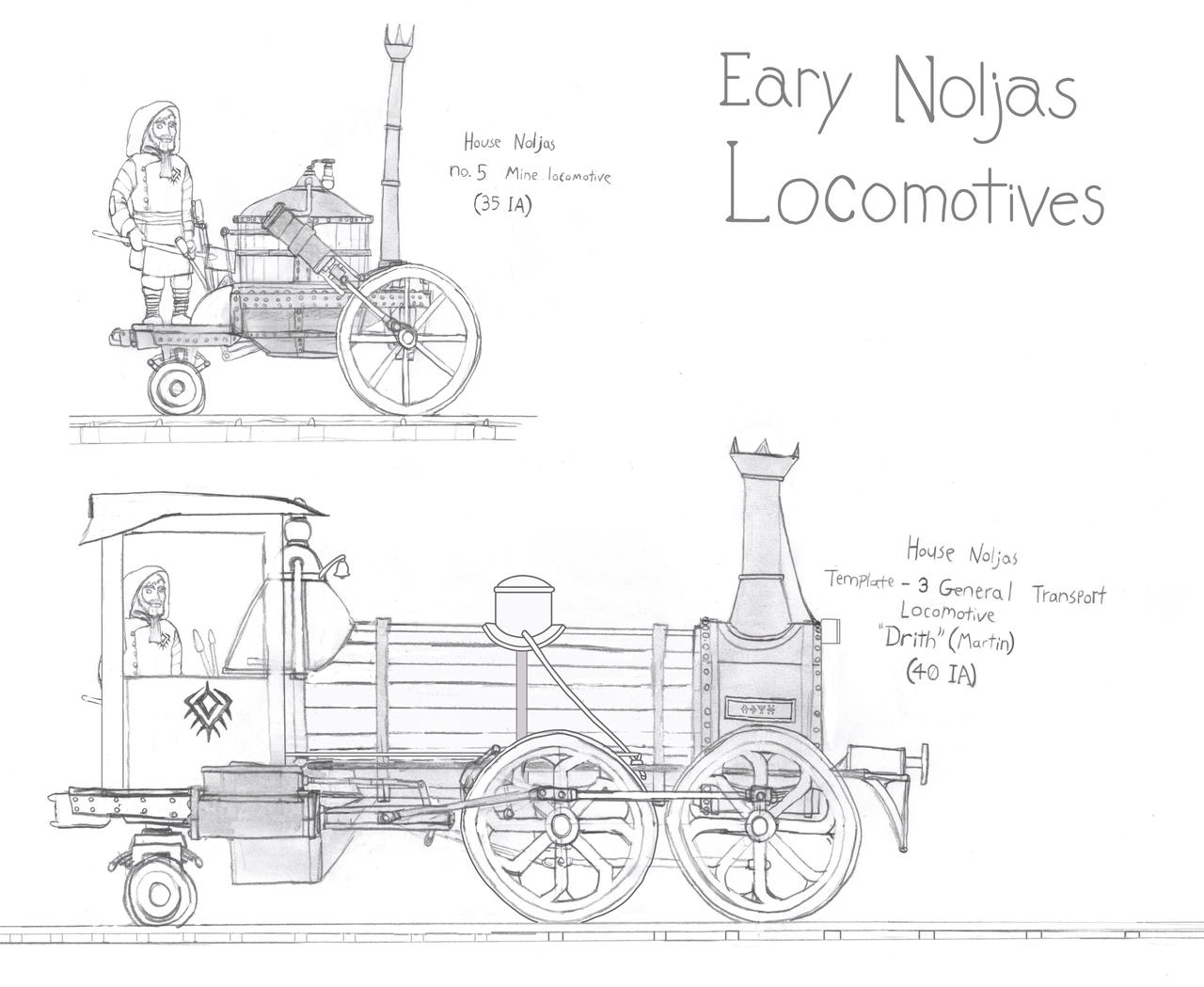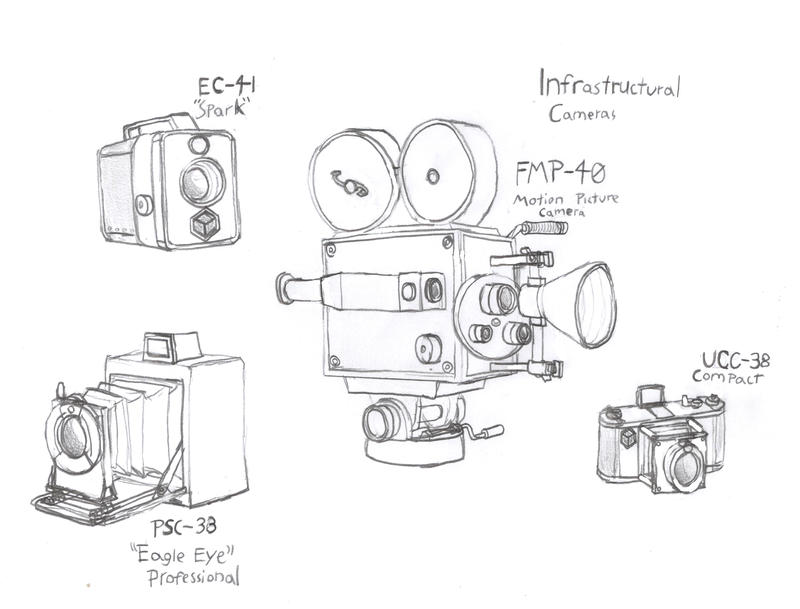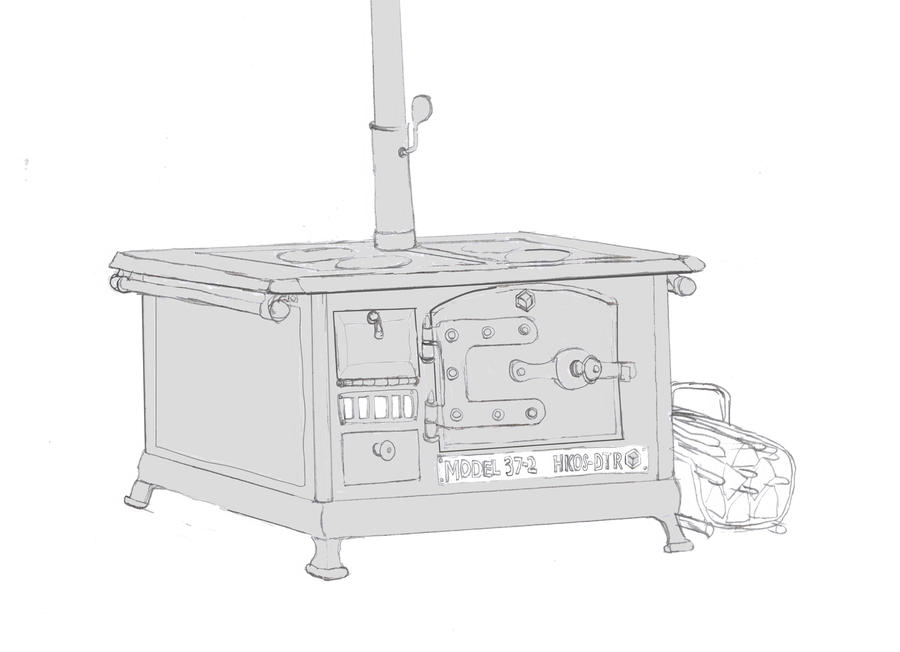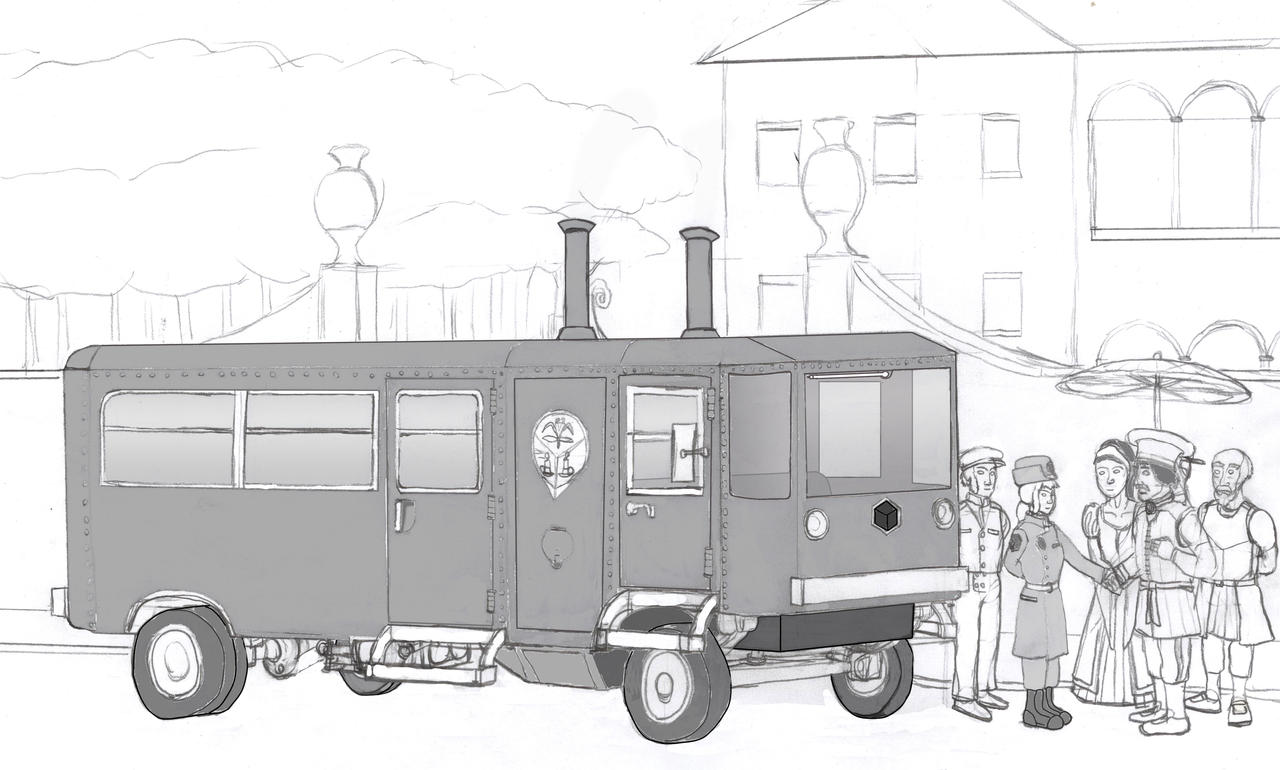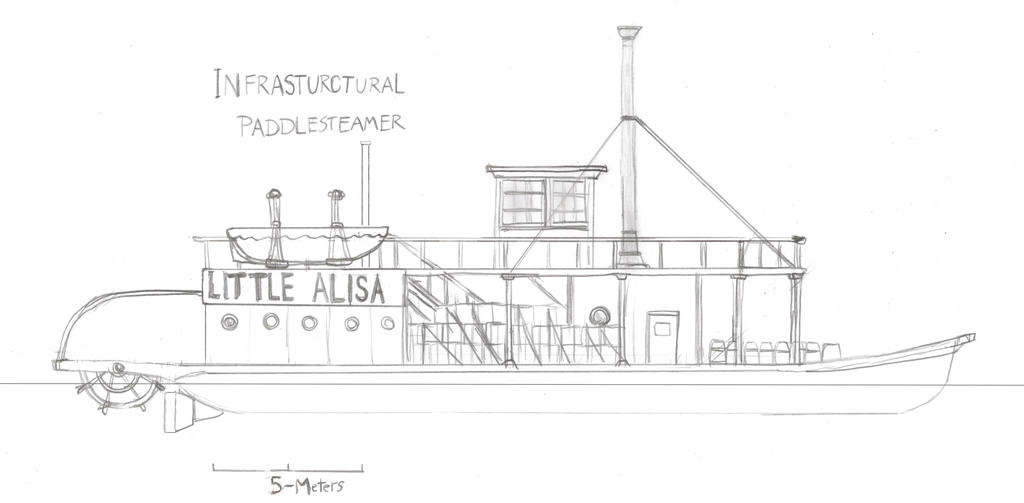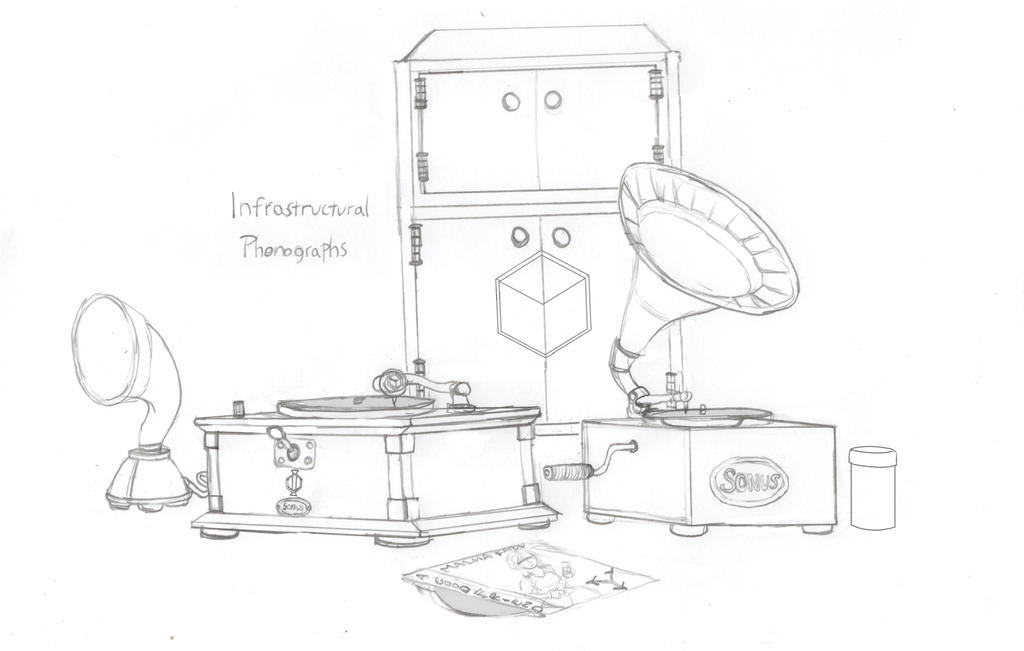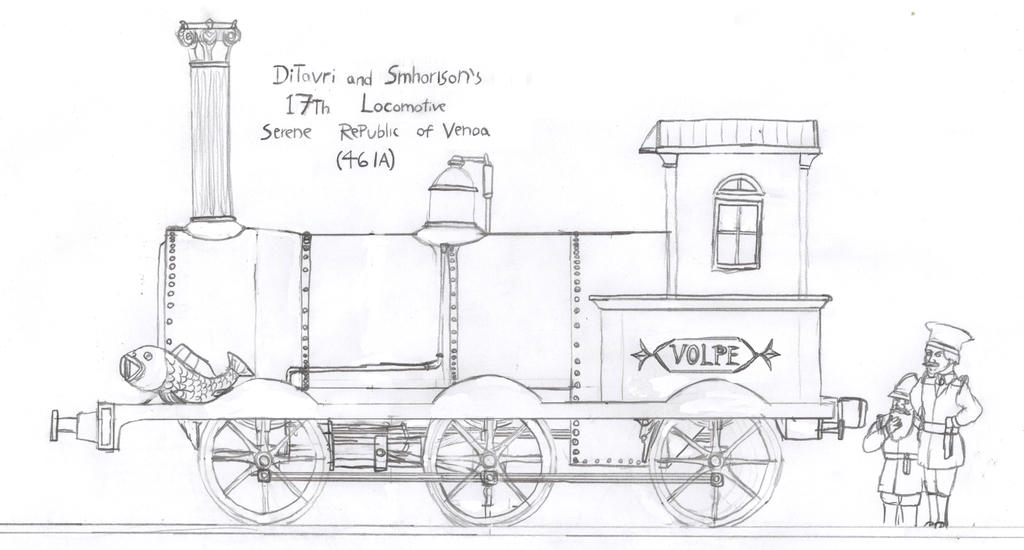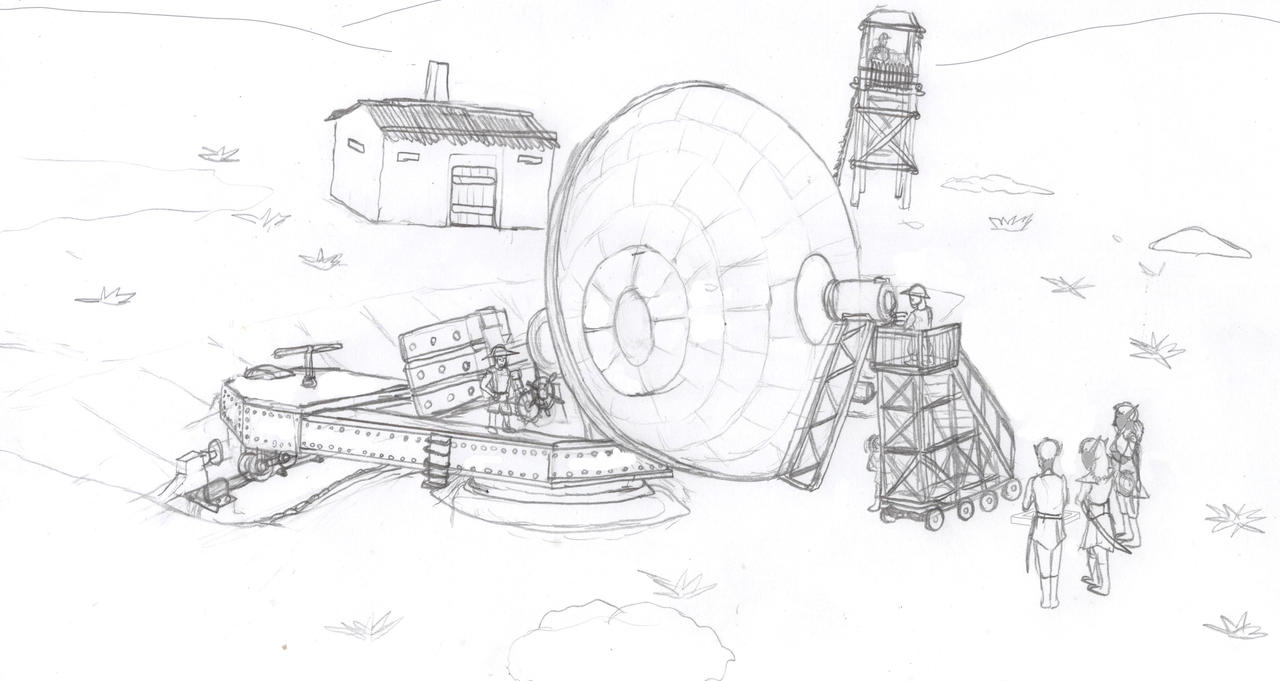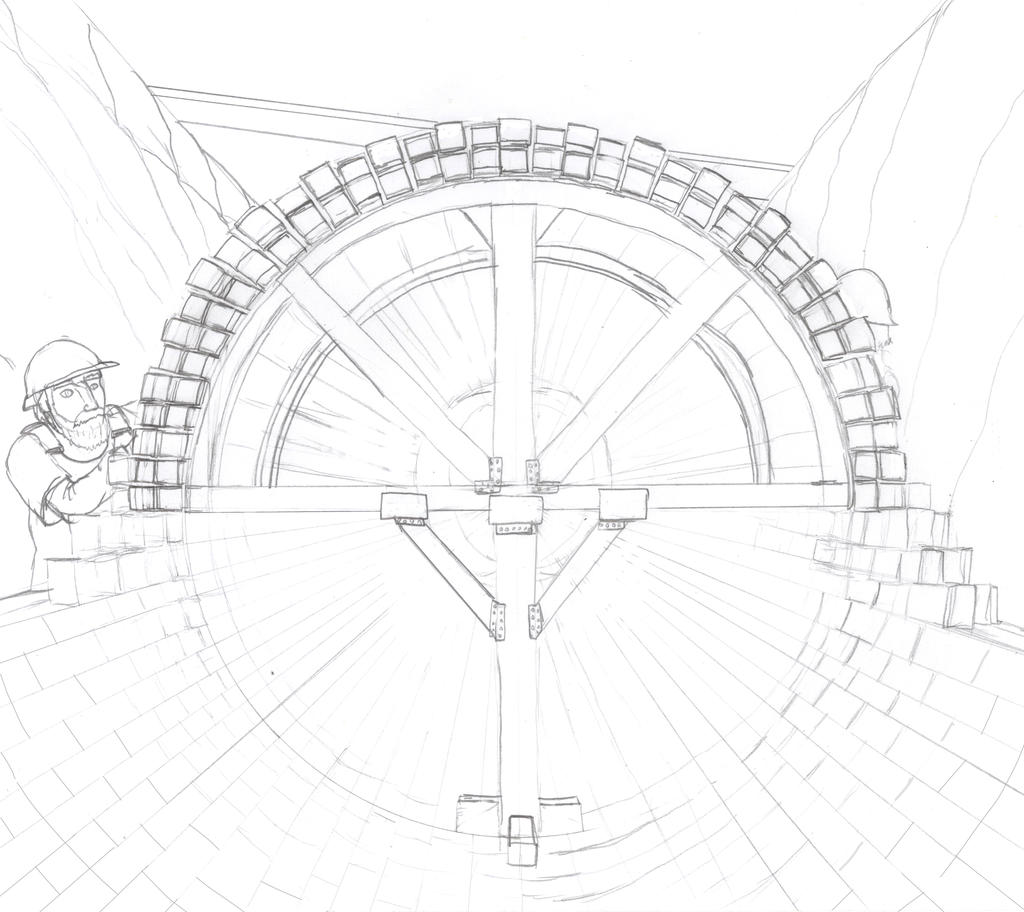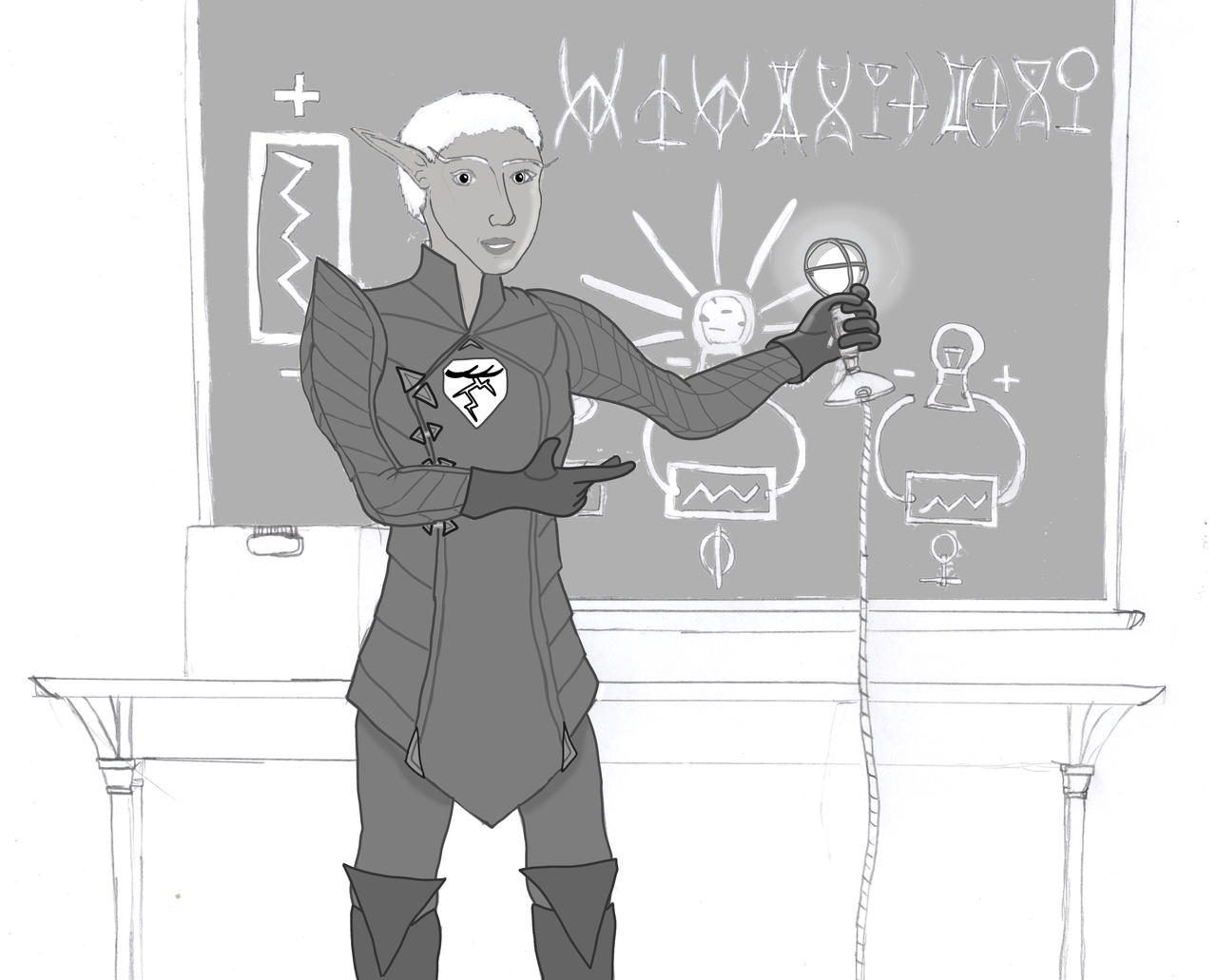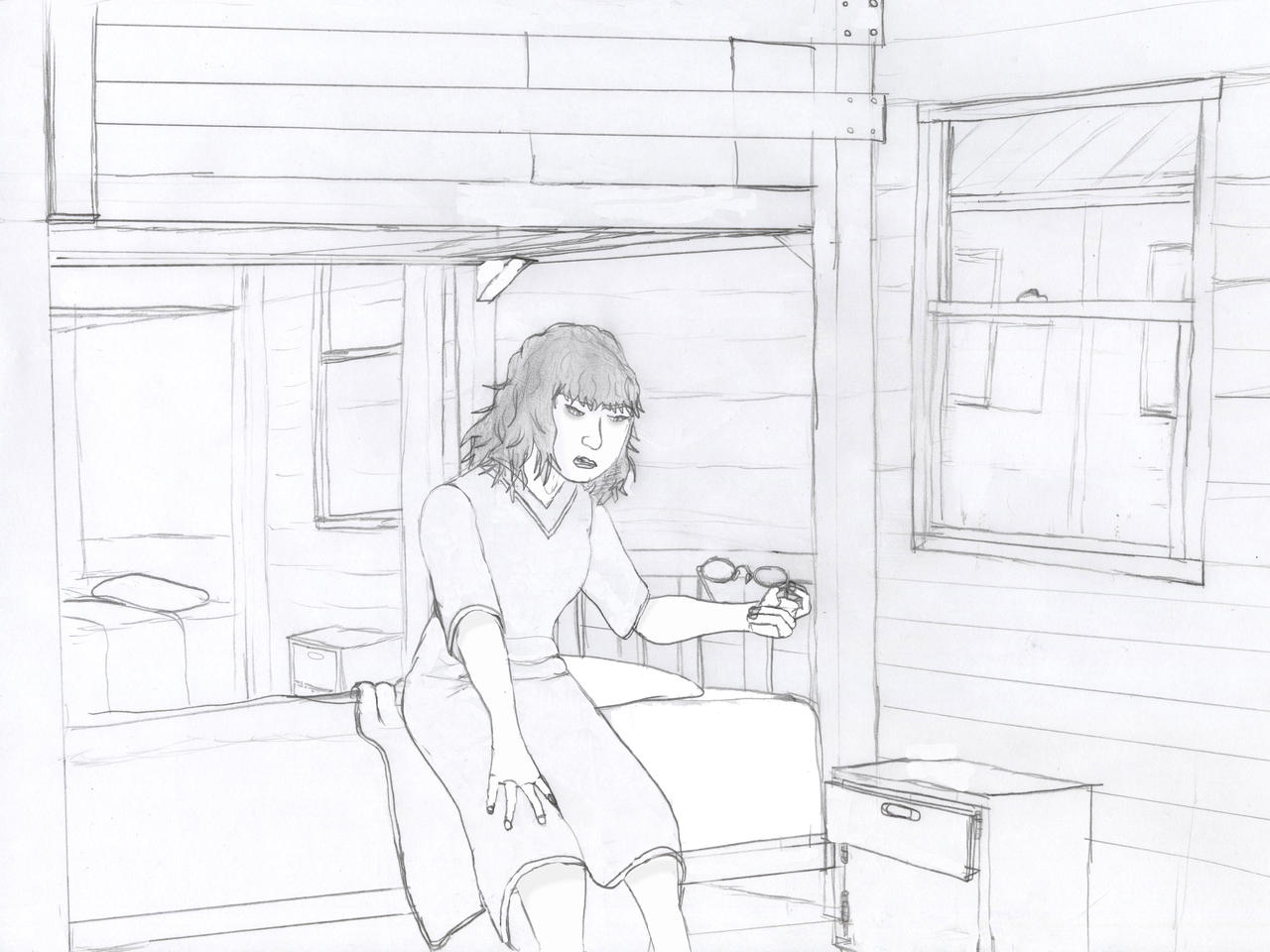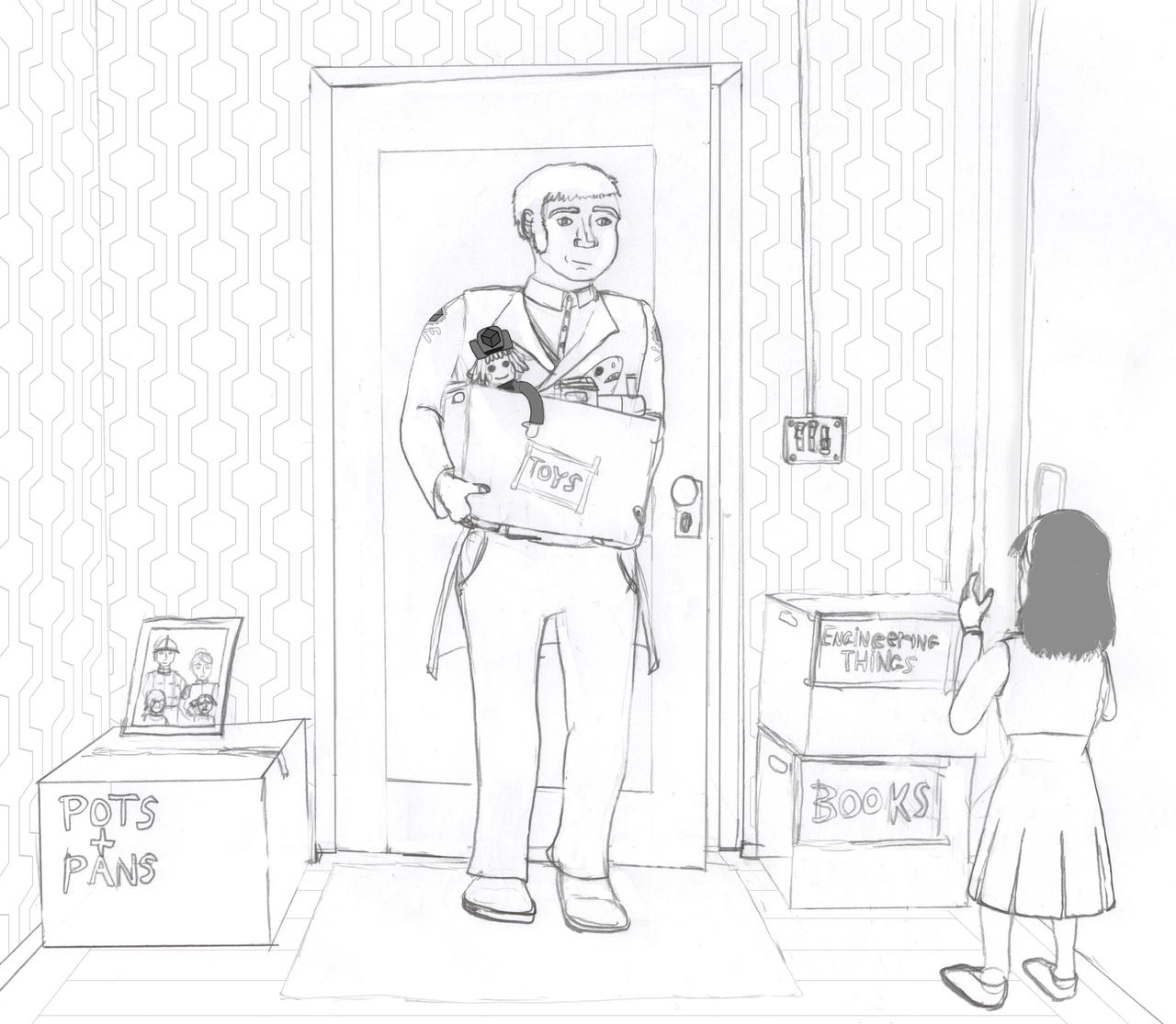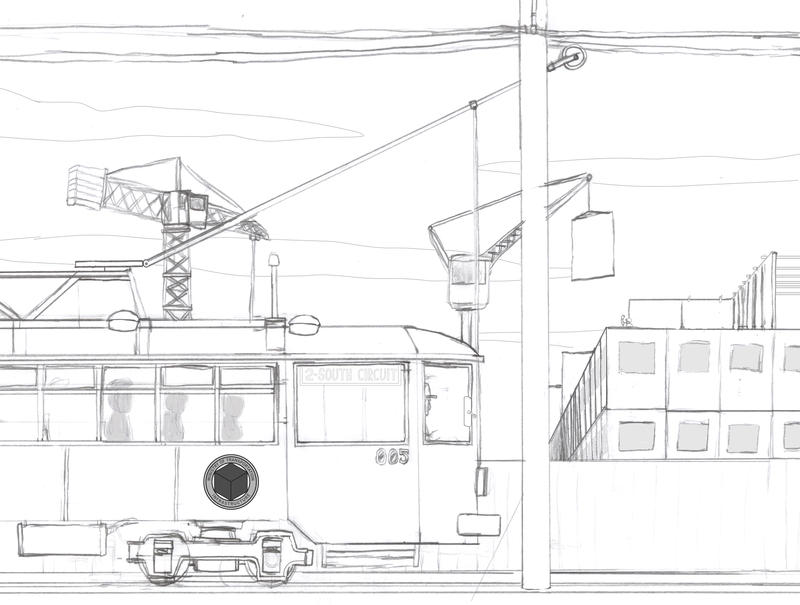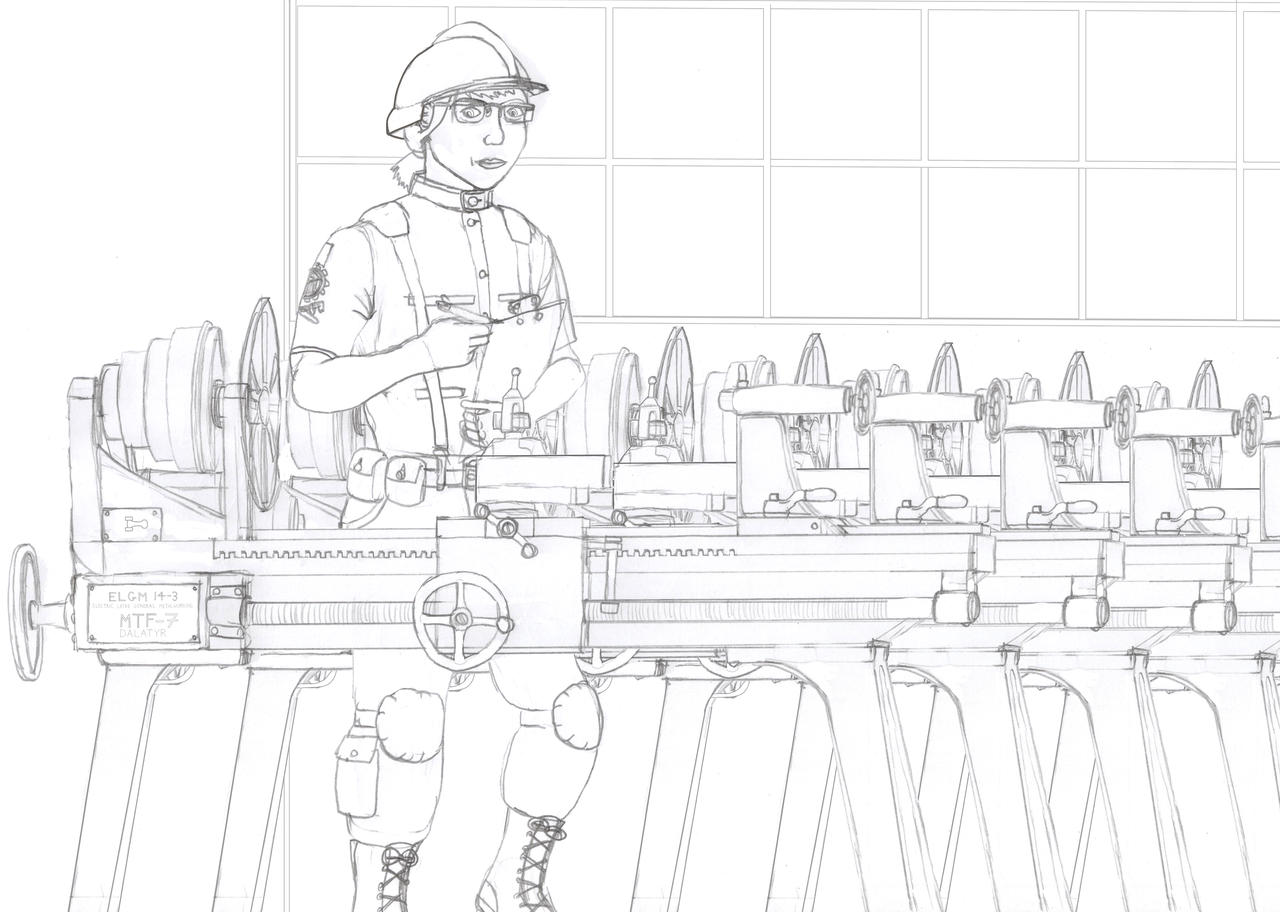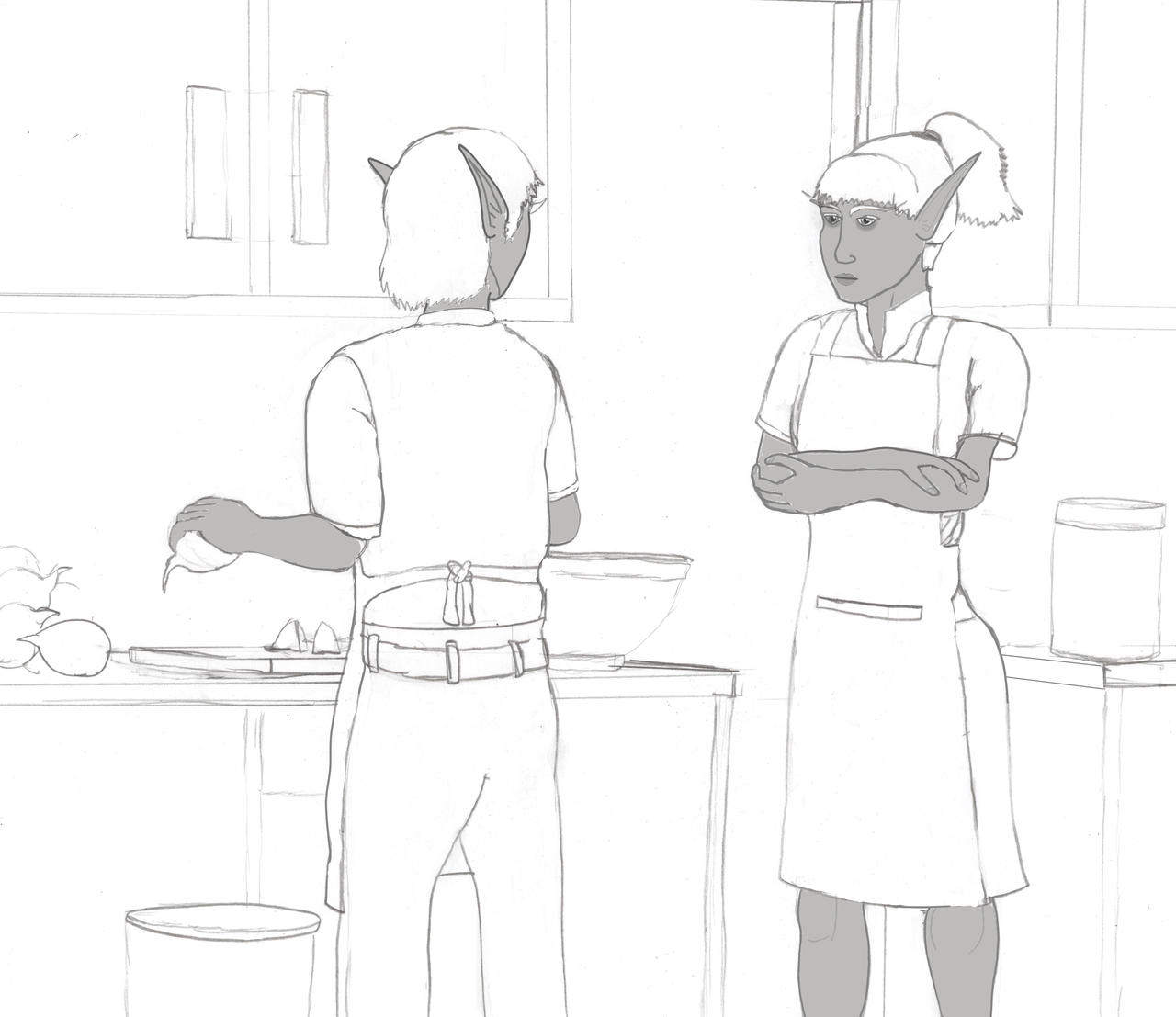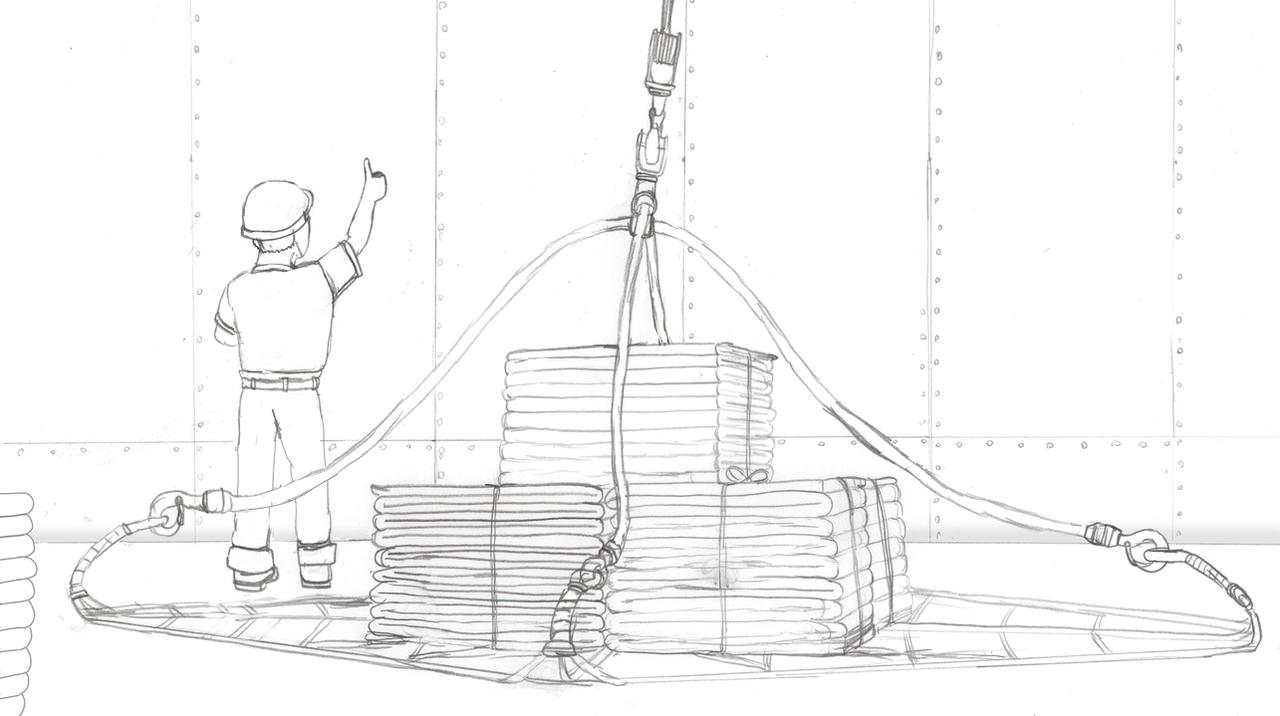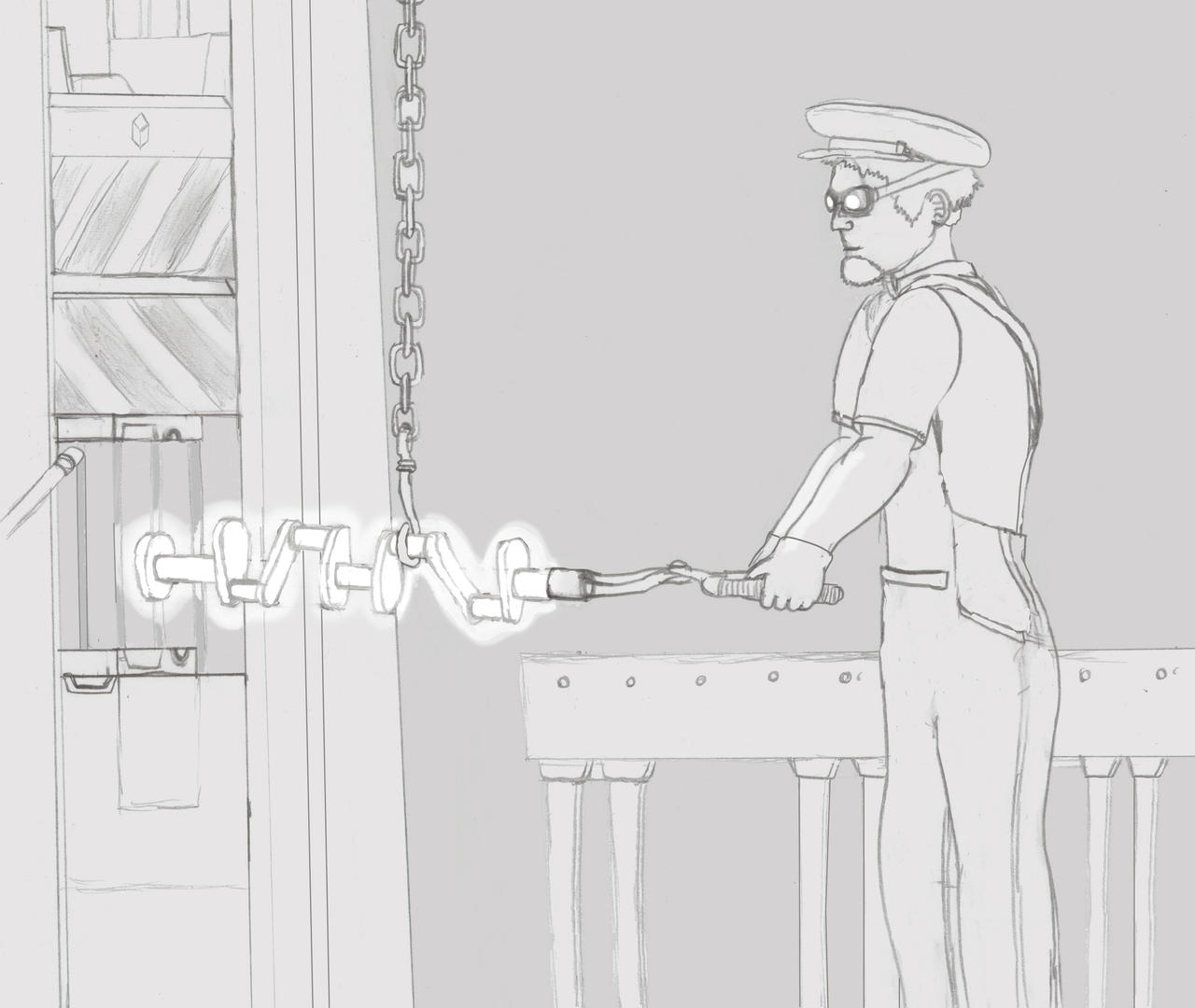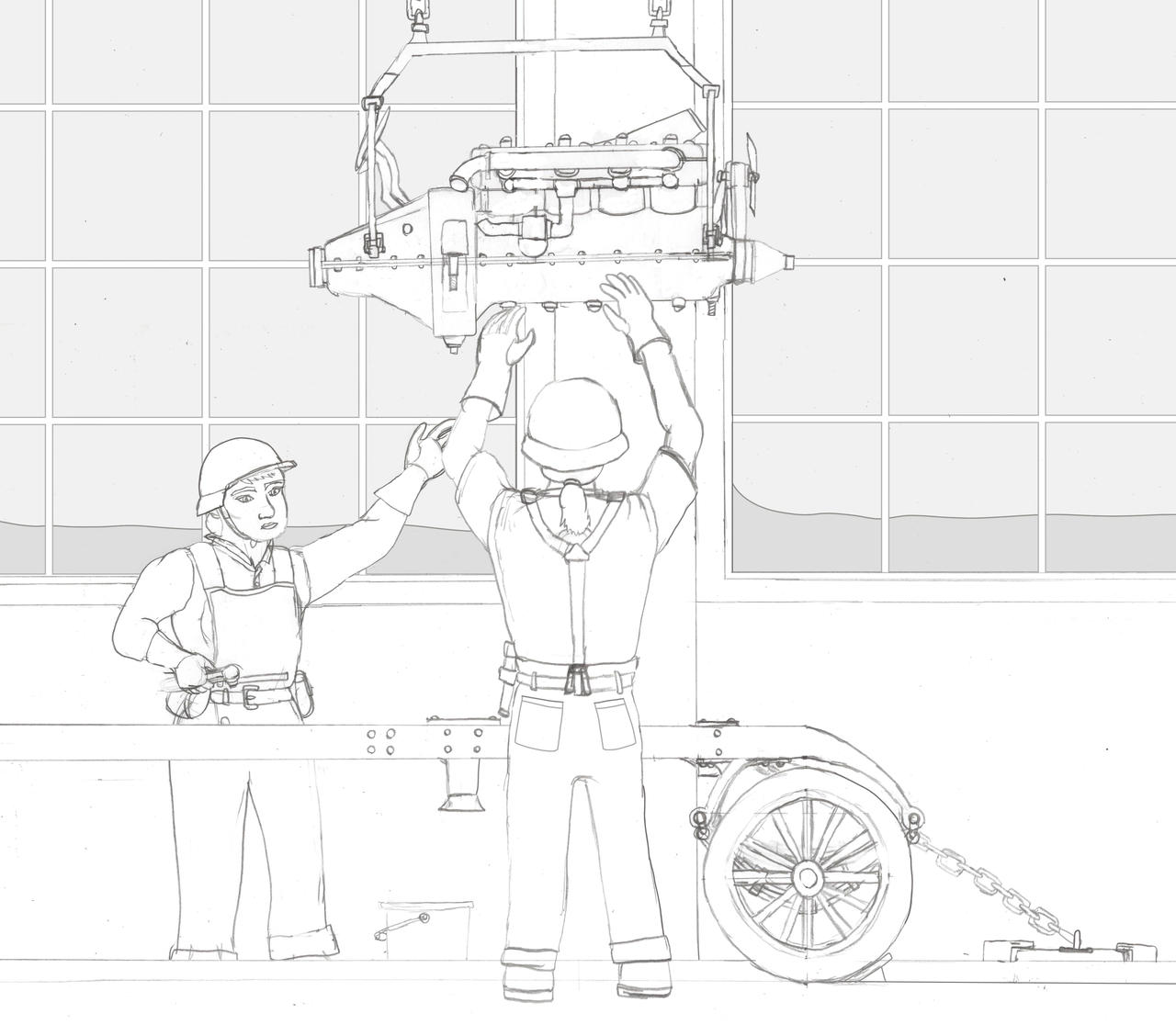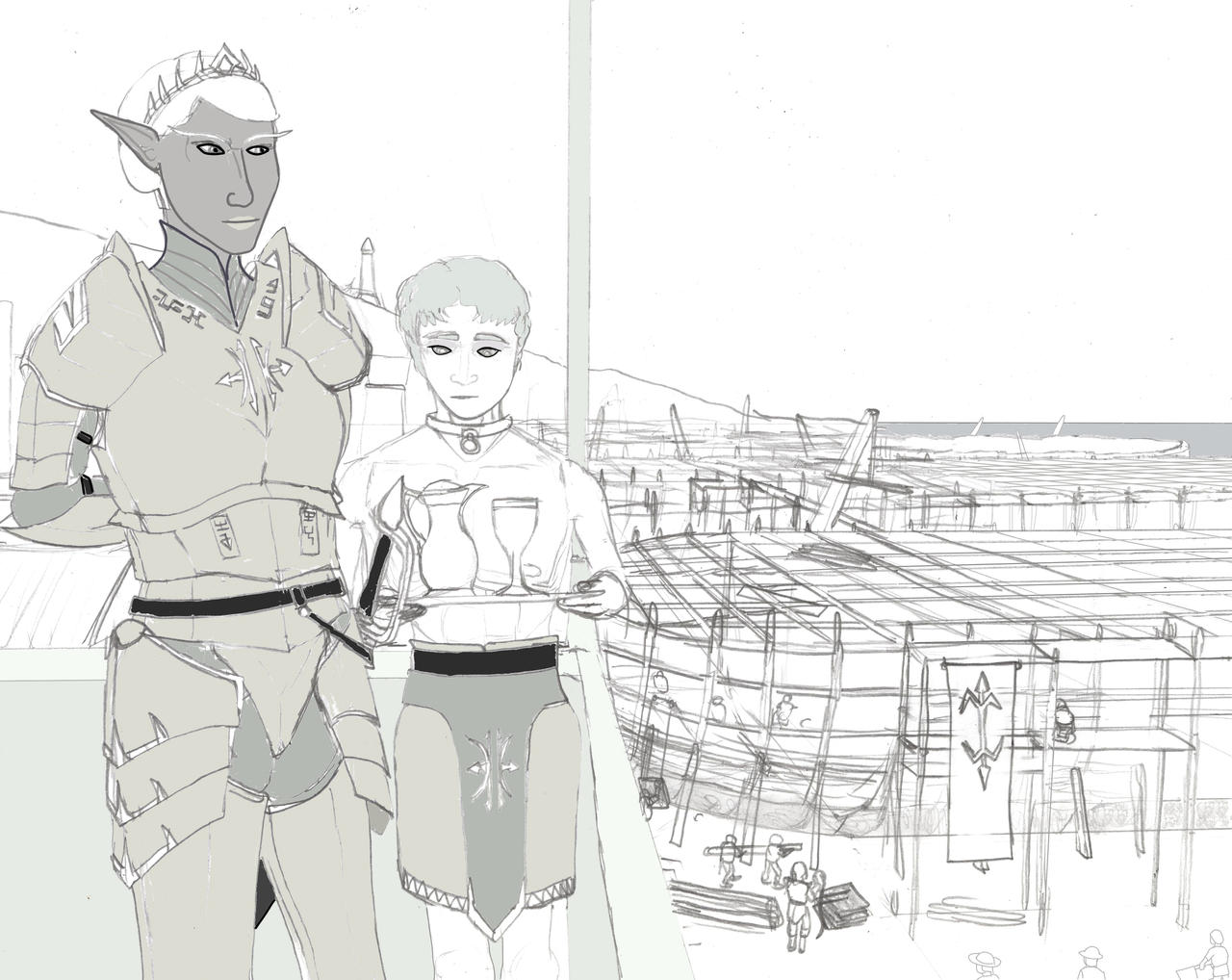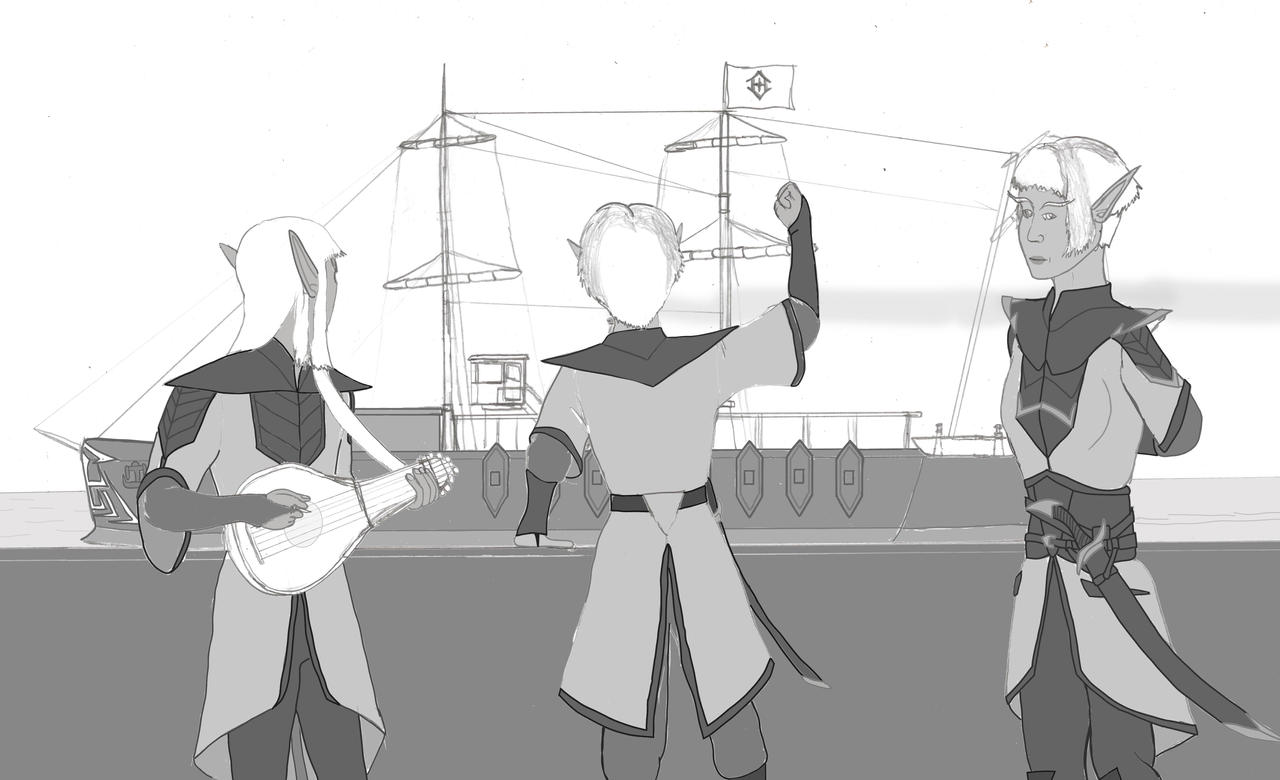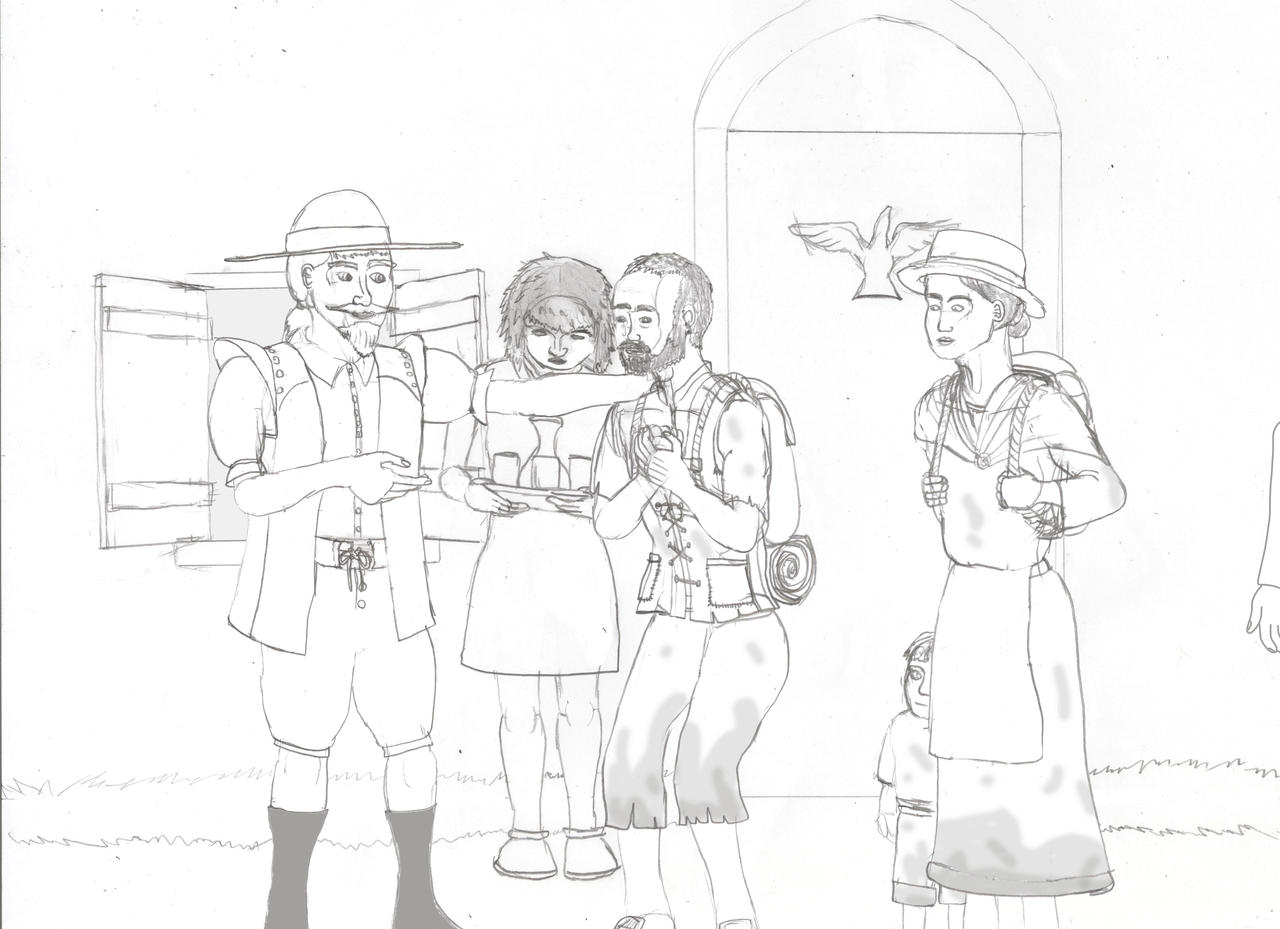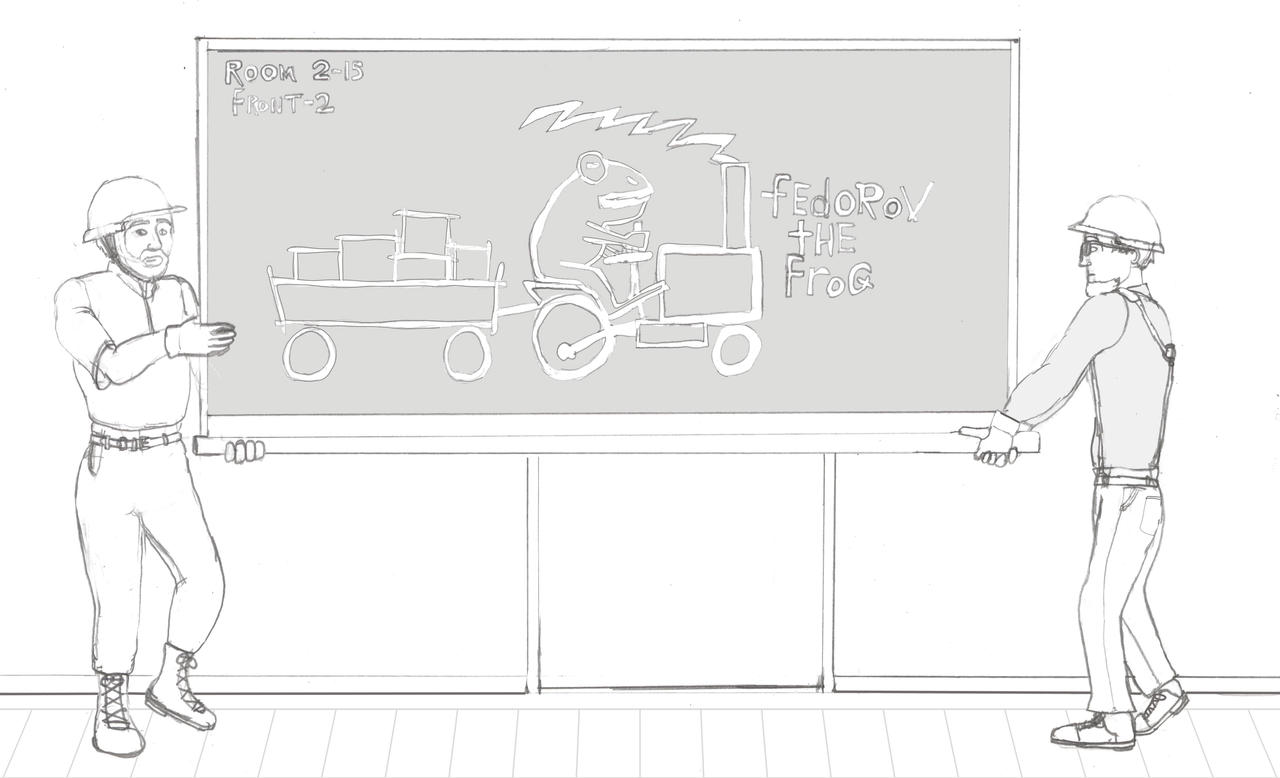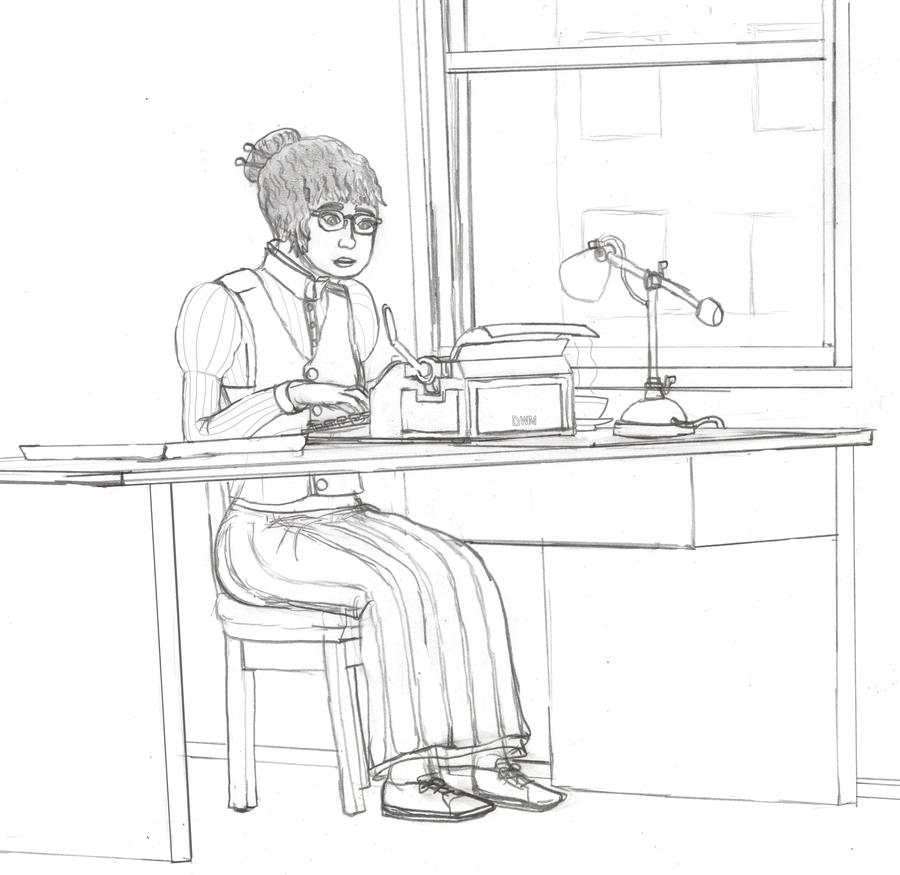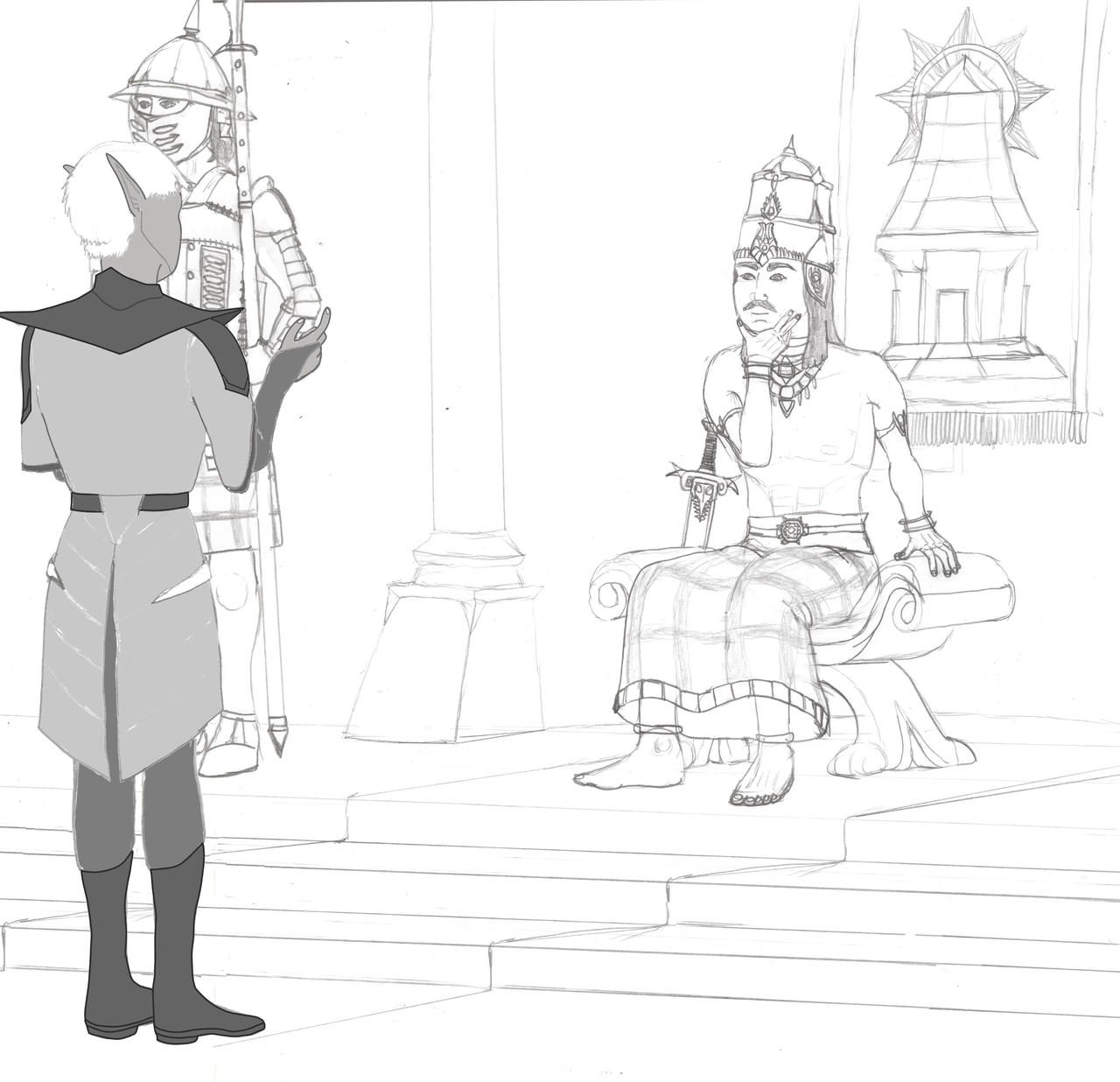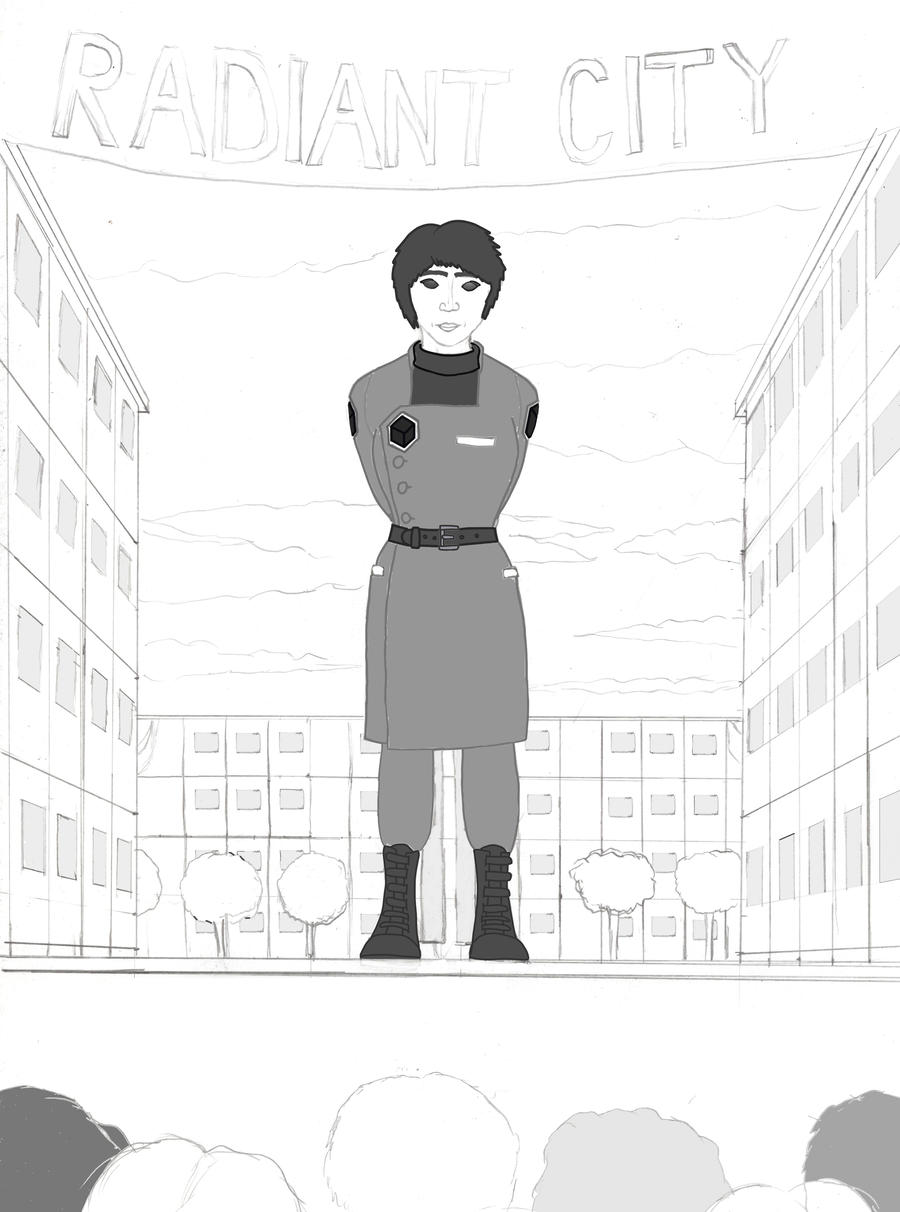(Galthirith, Late Winter 43 IA)
Galthirith was a land of serious winters; ocean currents spared the northernmost Drow State the extreme temperature drops of the Coldlands, but they were long and dark and wet. The end of winter involved cold rains, mounds of slush and rivers flooding. Most of the population, Dark Elf and Slave alike, still welcomed the change even if it could be a cold soggy ordeal to those who worked outside. On a small fenced in compound, this was compounded by the smell of the contrivances they operated; a set of huge metal and stone tanks crisscrossed by pipes, warmed by furnaces and with pumps driven by a repurposed mine-locomotive engine. The whole affair rattled, gurgled, chuffed and groaned ominously as it went along and it's contents sloshed about within it's iron guts.
"Well, the still certainly is impressive." Captain Firath ti'Doljeth of the Galthirith Navy said to the mechanism, politely leaving out the exact nature of the Impression that it gave. "And it can produce how much Dark Distillate?"
"Nineteen barrels worth a day from Still-Three, give or take." Tharsien ti'Uival replied with a more enthusiasm than decorum usually permitted. "Still-One can provide eight, Two can make fourteen and Four can make twenty two, though it's currently down for repairs."
"So they can supply sixty three barrels on a good day?" The captain replied.
"Yes, among our other products. Still-Five should be working in about six weeks and should be able to make another twenty five to thirty to the total."
"And the new complex that your patrons are building could provide six times their combined output by years end." The Captain remained focused on Dark Distillate.
"Slightly more than that if all goes to plan." Tharsien replied "And the process should go a lot more smoothly."
"Indeed. Master Alchemist, I must ask these mechanisms seem rather..."
"Crude?" Tharsien interjected.
"I would use 'inelegant'."
"Well in truth we are more or less making this up as we go."
"But why not simply recreate Infrastructural Stills?"
"First of all, we don't have detailed reports on them. The Committee keeps those facilities well guarded. Secondly our agents would be unlikely to get the whole picture tomorrow. Thirdly even if we get all the blueprints we'd have to make workarounds anyway. Finally while I don't doubt that the Stills that Infrastructure built in the Black Ports are better than these there's value in working things out on our own."
"To me it sounds like a lot of extra work."
"It is, but working things out for ourselves gives us a better understanding of why they work and lets us better solve problems when they arise. If a full folio of Infrastructural Stone Oil Still blueprints was dropped on my desk right now and the same was given to House Narxath we'd make better use of them quicker because of it."
"That was exactly what I wanted to hear." Firath replied grinning. "But as crude as your operation here is, I am satisfied with what I see and have confidence in what you can achieve. Dark Distillate is exactly the edge we need and your work here brings up closer to finally driving the Eternal Foe from the seas once and for all. Tell your Mistress she has my full support."
Tharsien gave a quick bow "It will be my Honor."
Four Years ago Tharsien and her team worked out how to fractionally distill Petroleum for House Noljas. Three years ago, a rowboat was outfitted with a small kerosene burning steam engine. Two years ago, Noljas shipyards refit a river paddlesteamer with an oil burning engine and put another in an small coastal freighter. Last year, an oil fired brig was built for Noljas' fleet and as a demonstrator for the Navy. Of course, there was some skepticism as well as the ever present specter of inter-house politics. Even so, there were also some clear advantages to burning refined stone oil over coal even leaving aside the matter of Infrastructural interest. More than that, Galthirith had the advantage in over the Coldlands in that their territory had substantial Stone Oil deposits. With the Navy's approval, Galthirith could pull ahead of the other Drow states in the Ironclad race by switching to an Oil Fired fleet early on. Not that the fact that it was thanks to her research that it was possible nor the fact that she was getting rich off the venture were overlooked by Tharsien.
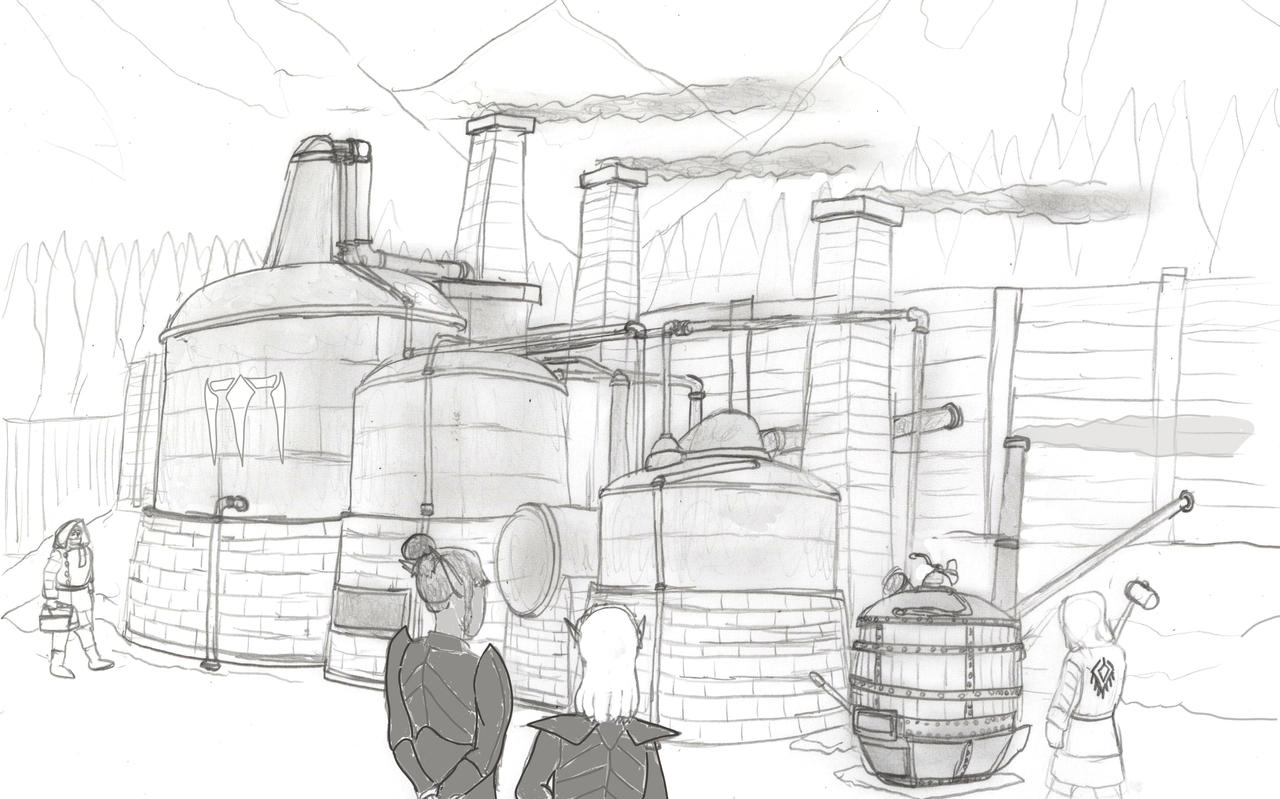 (Near the northern Forks of the Vera River, Infrastructure, Summer 43 IA)
(Near the northern Forks of the Vera River, Infrastructure, Summer 43 IA)
It was a hot summer day at Cooperative Verawylka 44, the sky was sunny with a few wisps of clouds and it was a balmy 32 degrees. In the fields men and women worked with sickle and scythe cutting through wheat, barley, and rye as kids came out with buckets of water. The Co-op had been issued a mechanical reaper last year, but with 18 square kilometers of planted fields most of the work was still done by old fashioned means. Yefim Tymich was grateful that he got out of that by milk duty. He loaded up a cart with milk cans and made his way into town, where it would be sold to townsfolk* and a Ministry of Agriculture dairy who'd turn it into butter and cheese. It was good money for the Coop, but more importantly for Yefim was the fact that the most of the work was done by Bereza and Sosna, a pair of strong and reasonably well behaved but still quite stupid oxen. He'd already completed his first run into town and was coming in on a second, glad to take it easy this day to recover for the harvest tomorrow even if the trip was rather dull.
Then suddenly things changed. After rounding a bend in the road he saw something moving fast and kicking up a fair bit of dirt. It was on wheels but had no driver. He steered to the side as the thing rushed by. It soon rushed by, making a strange puttering sound as it went along. Sosna mooed in agitation, but he soon got her back under control. Eventually the thing past by he made out fine details, from the rivets to the fuel tank and leaf springs to the wooden bed loaded with boxes. He continued to watch it as it receded into the distance. As he went by he saw a familiar face in the fields.
"Hey Alisa!" He shouted to his childhood friend. "You saw that?"
"Yeah." She said "I think it was one of them Roadsteamers. Never saw one before."
"Same, pretty impressive though."
"Yeah. Wonder what it was doing around here?"
"It was carrying something. Don't know what or where. I'll ask about."
"Alright, talk about it tonight." She said as the distance grew. Two hours latter he asked about it at the Dairy. It turned out that the Lorry had arrived a few days ago to transport goods to from the river port to Hub towns. It also apparently wasn't a Roadsteamer as it had a new type of engine which did not rely on a fire boiling water to work. Yefim's knowledge of such things was limited to what he could gleen about the riverboats, a few vague statements in school books, the occasional mention in newspapers and facts that have made their way down the grapevine. Verawylka 44 had been on a waiting list for a Steam Tractor for over a decade now and the rail line going into town was still a year away.
Over the span of 43 Years, Infrastructure had grown and grew over the Coldlands and had set in motion rapid changes. Dalatyr had grown from a small town into an industrial city of hundreds of thousands, Daagsgrad and Borogskov had more than doubled in population and now boasted the facilities to build and service a growing fleet of steamships. New cities such as Docklands and Vertebograd were coming into their own linked together by paddlesteamers, rails and roads. Electric lights lit up the night, music and news was broadcast, beasts of burden and animal drawn wagons increasingly competed with bikes and an increasing number of motorized vehicles. In the area around Dalatyr and increasingly around the other prominent urban centers work was increasingly mechanized.
But for all of that, for more than 80% of Infrastructure's population the pace of change had been far more sedate. Post unification the standards of living did gradually rise due to security, more even handed local administration, improved education and healthcare, improved trade, goods from Ministry of Distribution stores and various supplies provided to improve productivity. Even so, the routine reaping and sowing, storing supplies for winter, building homes from local materials, rising with the sun and setting down at dusk, milking cows, yoking oxen and cleaning out chamber pots continued. The true transformative nature of Industrialization had yet to unfold, but it's time was coming.
*
This was at the point still legal, even though the ministry of health increasingly pushed pasteurization.
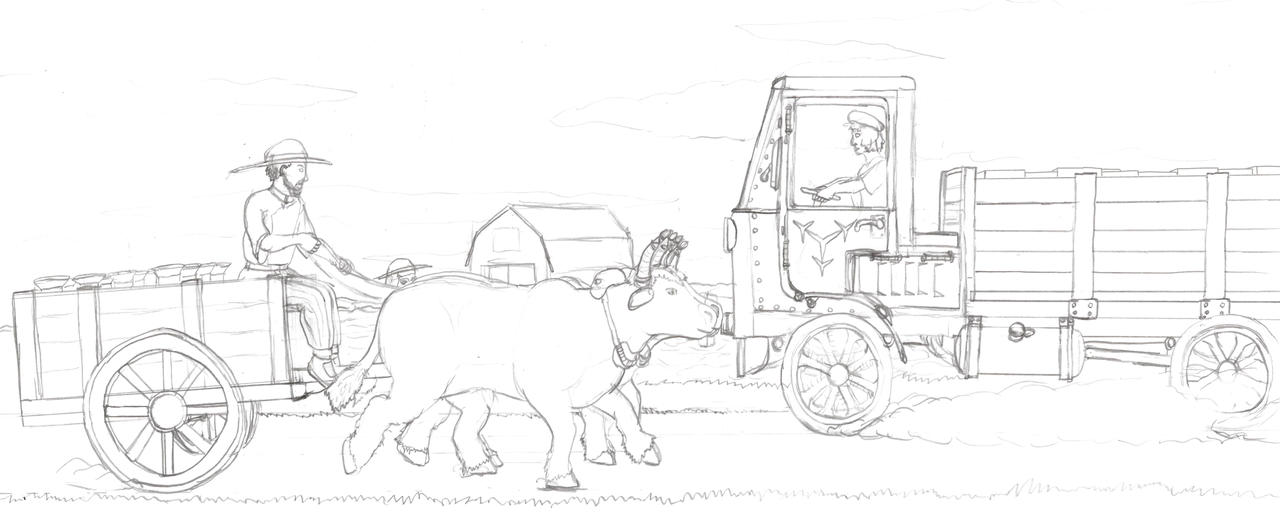 (Kingdom of Torion, Autumn 43 IA)
(Kingdom of Torion, Autumn 43 IA)
Six and a half years ago
Juanillo Fillipe Gruzman De Manoro's world had come to a catastrophic end. The third son of one of Avesia's oldest and greatest families he was born into a life of leisure and luxury on the family's estate near Whipmouth. His childhood was largely carefree and while adolescence came with responsibilities it still had it's pleasures and he could set his own way. Though he was unlikely to inherit the plantation, he had plenty of options and he found one that he liked. He had a knack for keeping track of commodities, deal making, reading people, and knowing when people were willing to buy, sell, haggle (and to what degree) and gently steer someone into the right mindset sign as well as worming out other useful bits of info. He'd gotten reasonably good at it and by seventeen had negotiating big rice deals with other plantations. He had money, influence, connections, slaves, good friends, girlfriends, loving parents, titles and (thanks to his mother) a mainland noble pedigree. He had a glorious future laid out in front of him.
Then one day a fleet of Infrastructural Ironclads showed up in front of Porta Liberium and soon after everything went to hell. Their army and mobs of freed slaves swept over the island like wildfire. He'd been in a platoon of militia cavalry which went up against a patrol of their Riflers on horned wheeled contraptions. He had his horse shot out from under him and he'd been lucky. They kept him locked up, first in a pen with thousands of other Avesians and then in a cell once they found out who he was after he was forced to sign a document he was unable to read. About a week or so latter was put onto one of their steamship with a few other people from prominent families that sent him away. A couple days latter they were escorted at night with bags over their heads into another cell in a mainland city. Over the next few days they waited with a mixture of hope and fear as one by one they were lead away until it was his turn. In spite of what the guards told them, they feared the worst. Despite that, his fears abated he was shoved in front of his uncle, count Diego De Gruzman.
The nightmare had ended, but he'd awoke into a dim grey world. His parents were dead, as were his brothers and his friends. His home had been ransacked and converted into lodgings for some brute of a rebel captain and his thugs. His nation stamped into dust by Coldlander boots and a vile republic thrown up in it's place. He was lucky in that he escaped death or the abject poverty that most displaced Avesian refugees found themselves in, though it was clear from his rescue that his savior had no love for him. The Count's concern was for blood and the well being of House Gruzman as a whole, of which he was only a peripheral member. For his ransom he had to sign over the remaining Manoro assets (including a trade galleon), work as a factor and marry the vapid daughter of a prominent merchant family to secure a ten year contract. The local peers mostly scorned him as being nothing more than an up-jumped pirate, the commonfolk kept their distance and while he found a couple of marginal friends and had gained a son, a daughter and had a third child on the way he was busy and isolated. As far as he could see, his life would be one of service as a sworn retainer who'd be subject to persistent scorn.
Thus it came as a surprise one evening when he was told that the Count wanted to to share a drink with him on the balcony. Normally the Count avoided him as much as possible beyond giving him terse orders, at most giving him a blunt "acceptable" or "satisfactory" if he succeeded. He normally ate at the far end of one of the three tables in the main dining hall. Even so, it would be foolish to decline.
The Count was there, it was hard to miss him. The Patriarch of House Gruzman looked the part; a well preserved sixty year old more than six feet tall, broad and muscular, bald, bearded and mustachiod and with a severe face which generally gave off an air of tempered disapproval. As the story went his grandfather had been both a lush and a gambler and had squandered much of the family's fortune and accumulating a mountain of debt. His father had been run ragged trying to sort the mess out and pay off his creditors, succeeding in no small part by marrying his daughter into House Manoro. When Diego took the throne, he also inherited his father's determination to rebuild the family's finances, but also it's reputation. He'd been a successful cavalry officer and was just as determined and ruthless in trade deals and court politics. He was judicious with money and miserly with signs of affection. He had a reserve of wrath, though he normally kept that banked. But for all of that, he cared for family deeply. He had a glass of wine in hand and he took in the landscape.
"Juanillo." He said neutrally raising his glass slightly. "Red or White?"
"Red. Thank you Uncle." A servant poured a him a glass, handed it to him and quietly departed. A sniff and a sip found a decent vintage. "How was your trip to Noldolia?"
"Productive, despite some unpleasantness." The Count replied. "I saw something most unexpected on the road."
"What was it?"
"An iron carriage, puttering swiftly about on fat black wheels without a team but with a pair of pipes spewing smoke. It bore the livery of House Valarisno, but it was the maker's mark that troubled me."
"A Hexagon?" Juanillo's eyes narrowed.
"Indeed." The baron took a swig of wine. "The land of snow and soot has brought yet another new contraption to our shore. Another toy which they amuse both children and the childish."
"...Uncle. I bare no love for them, but I must speak against being dismissive of their work." There was a bit of risk to the outburst, even if neither of them was fond of Infrastructure.
"Rest assured that I don't. Even if they use it to impress idiots a land engine free from rails* has obvious potential, especially given the stories of their steam powered war wagons. The issue is who's making them. Not some clever tinkers, not a clan of dwarves, but those damned machine cultists and their golem masters. Every year, they worm their way deeper into the kingdom gaining wealth and leverage. But more than that, they bloat our money lenders and give peasants and artisans ideas above their station. You father may have been the get of pirates, but at least they were pirate kings. The Committee will give any lickspittle peasant who can read their garbage a Bureaucrat's hat..." He spat the words "...and there are a few deluded fools who think we should do things like that here, even if it would be our ruin."
"Madness." Juanillo said.
"Madness that will be the ruination of the world, and madness which claimed your mother. We were close in childhood. It broke my heart when she was sent away, word of her death broke it again." He did not tear up, but his voice softened ever so slightly with that sentence. "All because the tin cowards would not take the fight to the Drow directly. They have hurt us and they are more than able to do it again. It is high time we contemplated revenge."
Juanillo nearly spat. "Revenge, against Infrastructure? But how? It's not that they don't deserve it but...they're well, Infrastructure."
"Have you heard of 'Fidelium'?"
"That village released Drow slaves far to the Southwest?" The story had gotten out in the last few years by a few Infrastructural statements as well as the general rumor mill.
"It's a bit more than that now. The last I heard there were more than twenty thousand people living there and it climbing, among them some mercenaries which they have declared 'lords'. Even so, it presents to us an opportunity."
"How?"
"The Dark Elves built Fidelium to spite the Committee and eventually strike at their Colony down there. By the looks of it, it's aimed at Infrastructure's weak point. The Committee is keen on Rock Oil, buying it by the shipload in the Kingdom and elsewhere. Keen enough to cross the ocean to claim it and fight off four Drow States at once to keep it. Cutting them off from their main well would disrupt their plans, possibly crippling them through thirst. The sooner the better, and that's where you come in."
"You're sending me there?" Juanillo was shocked.
"And your wife and children. I've sent my agents ahead and the Fidelian priesthood approved of my plan. Consider this a reward for service to the House. To my surprise you have proven to be adaptive and resourceful. Not that you would have to get by on your wits alone. You will go with some supplies and provisions, a purse fifteen hundred Trono will be sent with you and a hundred and fifty more will be sent annually for the next ten years, as well as a pair of capable men in my pay to serve as servants and bodyguards." It was a modest but serviceable nest egg and stipend, more than enough to establish one's self in reasonable comfort and establish a cash flow. The servants would be helpful, even if they would also be his minders. "And in a year or two once you have your new home in order, you will help your countrymen start new lives."
"You mean in Fidelium?"
"Correct. There are at least five hundred displaced Avesian Citizens in Noldolia alone, most of them living in poverty. In Torion they are day laborers, thieves and whores, in Fidelium they could once again prosper and work towards vengeance. Imagine Avesia reborn on alien shores standing triumphant as the Coldlander Colony burns, it's fools given the gift of a worthy master's domination. Your domination. Does this appeal to you?" In other circumstances, he might have asked for his approval or his consent to the plan. With Juanillo that would not be necessary. He could either go along with the plan willingly, go along under duress or if he was truly defiant be cast out.
Fortunately, that would not be an issue. "Very much, Uncle. I would like to work out specific provisions with your clerks as soon as possible."
For the first time Count Diego gave Juanillo a smile. "Excellent."
*
By 43 IA the Kingdom of Torion like many kingdoms was beginning to experiment with rail travel, with several groups including the Tivro Foundry and several Dwarven Holds building prototypes, short demonstrator lines/fair rides and work has begun on a few initial railways are being built.
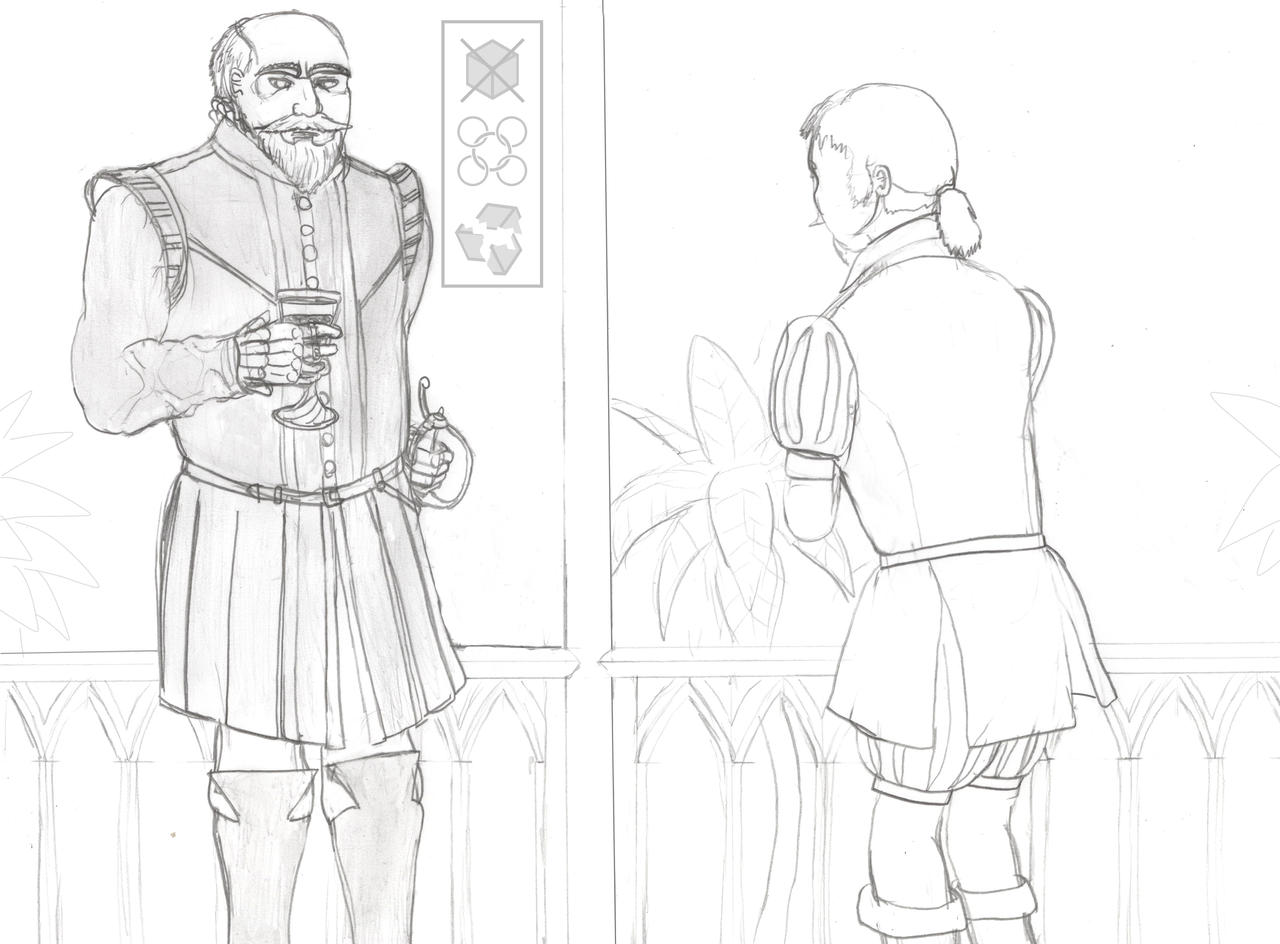 (Dalatyr, Winter, 43 IA)
(Dalatyr, Winter, 43 IA)
On a cold winter night a figure made it's way through Dalatyr, furtively moving from alley to alley, over fences, through yards and still construction sites and occasionally along walls. If it had to cross an illuminated thoroughfare, it would become fuzzy and translucent in it's dash. While it could not keep effect up for long when it in effect it made him close to invisible. All one would be likely to see would be vague sense of motion and a blur that could easily be mistaken for a shadow or a bit of snow caught up in the wind by someone not deliberately looking out for it. If one was to catch a glimpse of the figure otherwise, one would see a tall humanoid in dark clothes, face concealed beneath a heavy hood. In of itself this would be suspicious, more-so if they got a good view of the figure's face.
It's course was anything but direct. Partially to avoid detection and partially to throw off any pursuer which might had noticed it. Night shifts, electric street lights, security guards and Enforcer patrols made this city more difficult than most to operate in, let alone the other measures the Committee had set up. Fortunately most of those were concentrated around the Dalatyr Citadel and the remainder were mostly focused on a few key factories and facilities which the Infiltrator scrupulously avoided. Once the destination was reached, the risk factor went up. That involved scaling a building and getting in through a sky-light. Usually roofs were safe, but the Committee had eyes in the sky. There were not many of them and bad weather did limit their operations, still it would mean being exposed. The figure scrabbled up the wall, crossed the roof top, secured a line, opened a window carefully and repelled down to the warehouse's floor.
Raijhiv ti'Toryth's fine boots touched the hardwood floor softly, making nary a sound. He took in in the dark surroundings and listened carefully for a few seconds. He heard no footfalls, no chatter nor challenges, no doggy murmerings. Just the faint sounds of wind against the windows. With that he let out a grin. So far, so good. He'd evaded detection in his infiltration. Now he could get to work. He channeled a flow of magic into his left hand and cast a spell. It was a simple, one of the first spells you learned as a child, but it still had it's uses. A light appeared in his hand which he left to float in the air casting a dim glow. It would only last a few minutes, but that was more than enough. The shadowy figures around him resolved, but as they became more clear his good mood drained away.
Over the last year House Valcas' spy ring received word from one of their Dalatyr Contacts about a big project in motion at Foundry-3. The main furnace had been modified, new machinery had been brought, a couple new buildings had been built in and it's workforce had nearly doubled in size with most of the staff being promising. In of itself, this was not unusual. But unusually this was happening on the quiet. There was little fan-fare about the project in the paper or on the broadcast. It could be that Foundry-3 was working on a major project, some new weapon or key bits of industrial equipment.
Instead there were Radiators. Big solid cast iron things that were filled with water to warm up rooms. You saw them in some offices, shops, workshops and some apartments. By the looks of it there were hundreds of them in the warehouse, probably more than a thousand. But beyond a few well worn push-carts and winches that seemed to be everything this warehouse had.
He let out a faint sigh. This was a risky operation he was out on, but the leads had been promising. Getting a lead on some new type of weapon, vehicle or manufacturing machine even before the Committee could fully use them would do a lot to narrow the gap. Uncovering their plans to arm up could let Valnothron properly respond and could probably be leveraged against Infrastructure. Instead it turned out that they were casting things to make Coldland winters less miserable for their toiling masses. In of itself this was a relief, though he'd gain little glory. Even so, he took out his
Spark camera from it's special holster and took a few pictures for completeness' sake. They would not be good given the poor lighting, but they'd suffice. In any case, casting happened on it's own time table and the last thing is for a few workers to add a few more radiators o the pile while he tarried. With that done, Raijhiv climbed back up to the skylight and left the Hot Water heater be as he began his return journey. It would involve more dashing about, catching a ride on a box car and six hours trudging through the snow to get to a makeshift cabin, time which he spent coming up with the best possible way to word the fact that the leads were a bust to his Handler.
A summery of Raijhiv's report was relayed to Valcas house with a comment from his immediate superior that previous reports of a major project in the works had been false positives. It would prove to be a remarkably short sighted addendum.
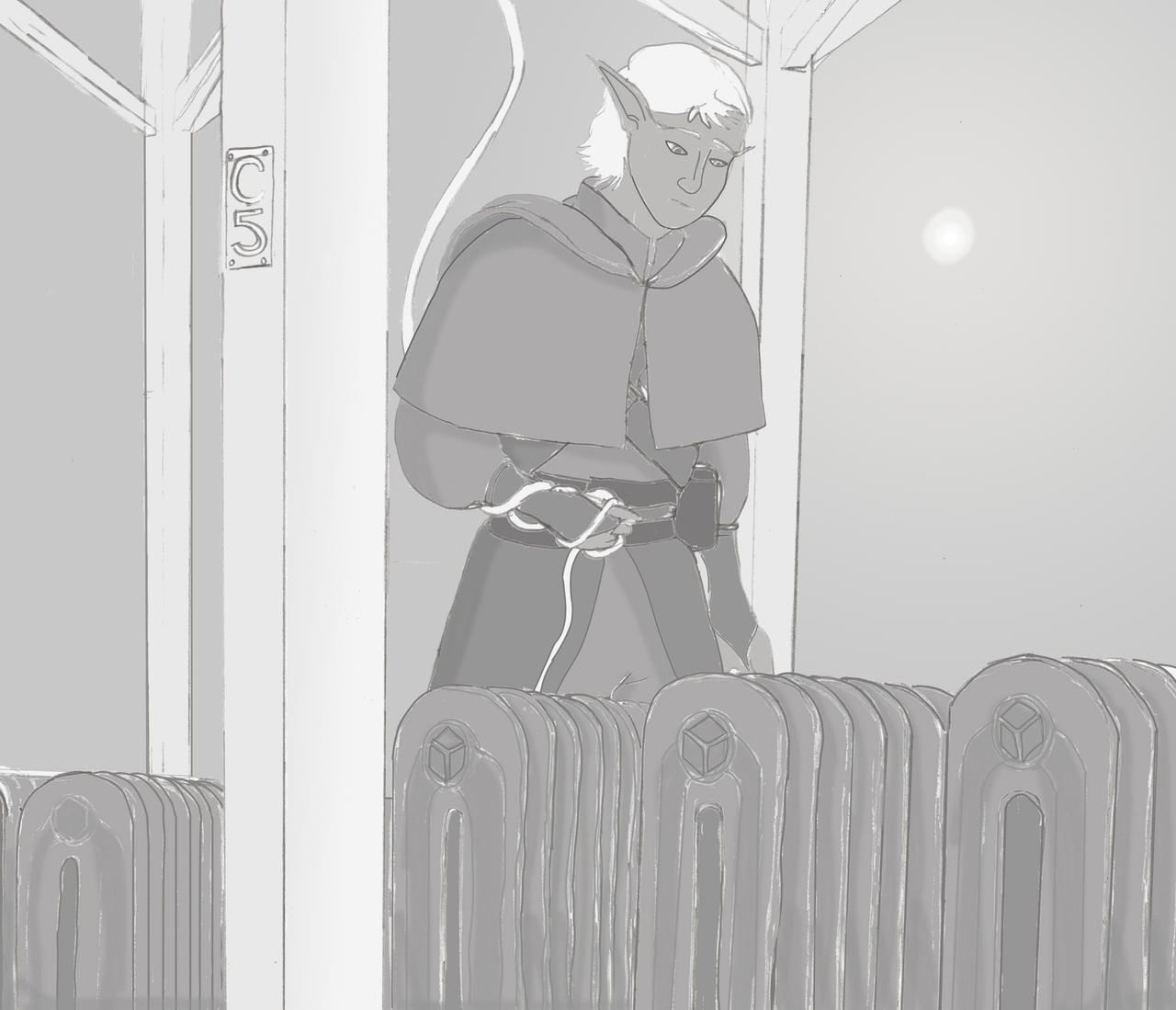 (Fidelium, Summer, 44 IA)
(Fidelium, Summer, 44 IA)
In Portus Fidelium*
Belis Second of Vhas stood attentively if somewhat anxiously by her stall. Around her was the bustle of the marketplace: men and women buying, selling and trading items. These ranged from carpenters tools to toys to chairs to bowls, but most people were like her selling food. Everyone needed to eat, more people were regularly coming in and more homesteads were constantly being set up to feed them. The market was rich with former slaves, as well as some mercenaries, a few Gosho traders and a smattering of other outsiders. Over the last four years Belis, Drim and Soth had brought in eight harvests on their farm. They sent their grain to a mill, taking some of the flour for their own bread and selling the rest of it through it. They grew a lot of grain and they could get a fair deal of money doing, but you could get more coin for a cartload of produce on market day. She'd made the day-long journey into the city with Drim, who was currently out selling a pig and buying some new cloth while she minded the stall. Out of the three of them, to whom the closet thing that any of them had to money before coming to Fidelium was Ceramic Reward Tokens, she was the best at dealing with money. She also had to mind her two little ones.
Eventually a pair of figure made their way to her stall slowly and deliberately. One was a well built man, the other was a short young woman moving along at a slow steady pace on a pair of peg-legs and a cane wearing a well made new tunic. A familiar sight and a welcome one.
"Scribe Kainla!" She said in greeting to one of her best customers.
"Day's blessings Belis." Kainla replied. "I hope all is well."
"We're just fine." She said as she hushed her daughter Melnin "Business has been bit slow today." She'd moved some produce and the day was still young but it was
"I'm surprised." Kainla replied "These are beautiful vegetables fit for a Drow's table."
"You're too kind."
"And you're too quiet. People would want them if they can find them."
"Humility is an Anthropic Virtue you know." It was a common axiom for Drow Slaves and one she'd been told all her life.
"That it is, but we're talking about the produce here. You and your two partners grew it and harvested it, you are selling it on their behalf and on behalf of these little ones." She gestured to Morhi as hid from view. "This is not about making yourself out to be more than you are. This is about better serving your family and your customers."
"I guess so."
"Anyway, I'd like three cucumbers, eight tomatoes, two vaul of green beans, five vaul of sweet potato and a chicken. That should be twenty six assarii**."
Belis gathered up the produce, weighed them up and counted off the coins as she went. She'd never been taught mathematics as a child, but she was getting a grip on it. The chicken was a big sale and she tied it's legs and beak up with twine for Kainla's assistant to carry home.
As the last coin entered her hand and was put away in a cash box, Belis smiled at Kainla. "Your custom is most welcome, Scribe Kainla."
"And I would like to propose some more. The next time you'd come into town, I think that you should come to my house before you reach market. That way we'd have first pick of your fine produce. We'd pay you an extra As for every four in your regular prices."
"Well, that is a lovely offer Scribe. But where do you live?"
"62 Devotional Street. Devotional is four streets uphill from the market on Prelate's Way, then go north for two blocks and you'll be there. It's green with a two-man saw over the door. Don't worry if I'm not in, i'll instruct Snerl to see to you. Just give him this." She handed Belis a piece of paper. She could not read it, but it had the address and the basic arrangement written on it.
Belis was shocked and at first did not know how to respond. She fell back on politeness. "Well this is most kind, thank you scribe. I will remember this next time."
"Wonderful. Now I must be going. Give Soth my day's blessings." With that Kainla walked off and.
"Mom who was that?" Menlin said as he tugged at her apron.
"A Scribe who's made our lives a little nicer." Belis said in response. A short while latter, she gave a cry. "We have nice Vegetables here! Come buy them!" She'd continue to do so and it soon enough it seemed to work as more buyers came by. At the end of the day she had two Gladii, four Denarii and eight Assarii in small change. This had been her best market day, though better ones would come.
*
The initial settlement of Fidelium that rapidly grew into it's first city. Initially this was largely synonymous with "Fidelium" but as satellite villages and towns began to emerge, the need for differentiation became more pronounced.
*An As (plural Assarii) is a low value fidelian coin. 12 Assarii is a Denarius and 12 Denarii is a Gladius.
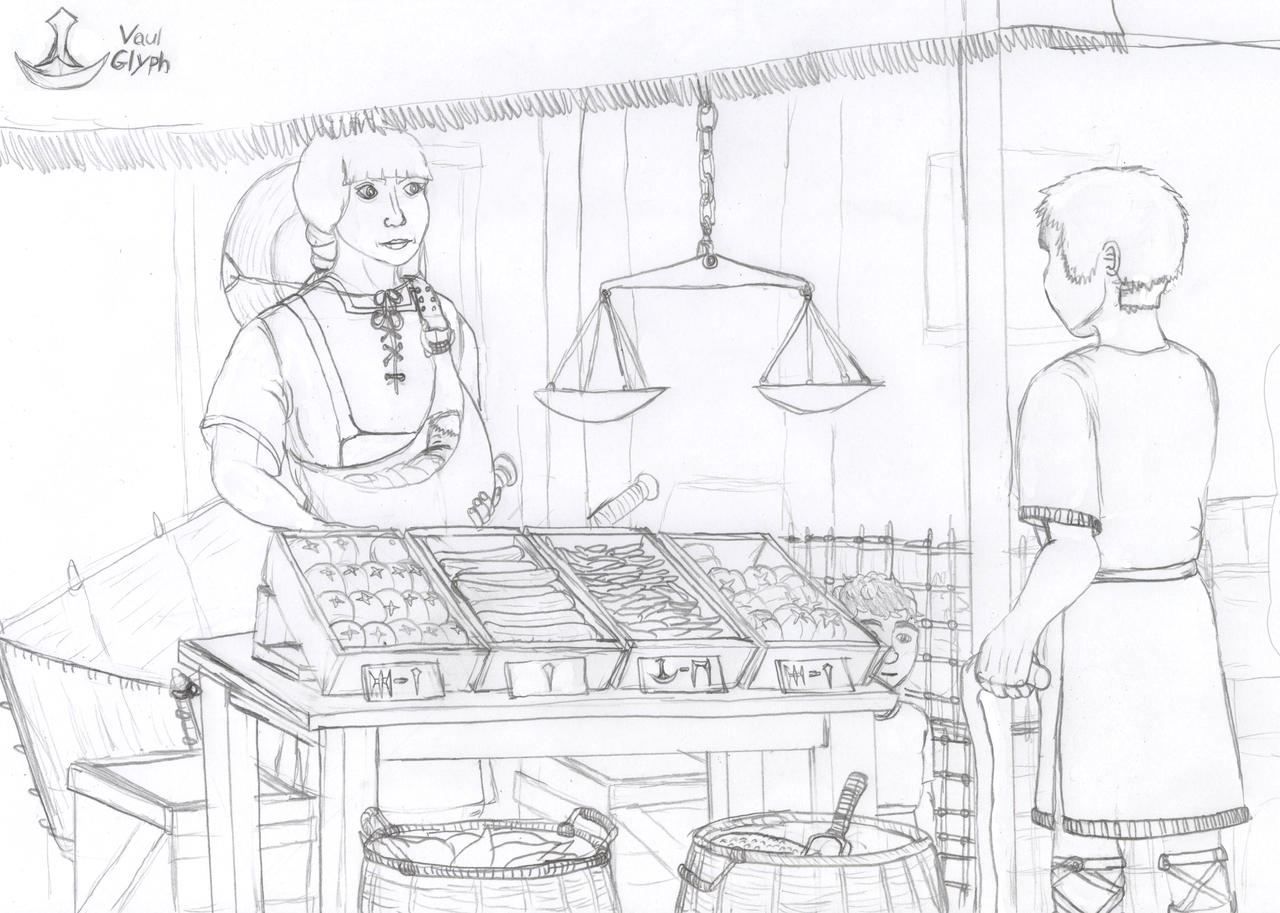 (Dalatyr, Late Autumn, 44 IA)
(Dalatyr, Late Autumn, 44 IA)
Around the clock come rain or snow, trains arrived in and departed from Dalatyr Rail Logistics. It was the world's first Rail-Station and even as new ones were established and grew it would not be eclipsed for decades to come. Even when passenger services was largely shifted to Dalatyr Central Station in 28 IA and a few factories were given their own branch connections, it continued to grow. Dozens of silos, warehouses, storage yards, aggregate stores and (most recently) oil and petrol tanks were attached to. Among them was Warehouse 71, which had a pair of overhead cranes for loading and unloading, stored a wide variety of products and was otherwise unremarkable.
Keeping this system running in 44 IA were over three and a half thousand stevedores, Signallers, supervisors, Shunter crews, technicians, mechanics, crane operators and more employed full time by the yard with more coming in as day-laborers. Seymon Nil had been working here for fifteen years. He'd did not have a lot of education and it had been reasonably well paying job. He'd been taking Adult Education classes in the evenings and he had hopes of making supervisor at the next quarterly test. That would mean a larger wage, more time indoors and less heavy lifting.
Even so, on a cold late autumn evening he had a train to load and cargo to square away. Fortunately for him, he did not need to do a lot of heavy lifting at the moment. That was done by an electric winch on the overhead crane, which lifted the heavy objects up and set them down. He had to make sure that they landed softly and in the right place on a flatbed car, removed the harness and then securely fastened them to the flatbed. After that he'd cover them with padding and over that a tarp. Once that was done he'd close up the sides, signal the shunting engine and wait until the next car to be brought into position. By the look of it, he had another three and a half more cars to go which would probably take up the rest of shift. An extra set of hands would be useful, but he was not worried about falling behind.
Currently he was loading up a lot of big heavy complicated machine tools. He recognized a few of them from the yard's machine shops, but others he could not make heads or tails of. One of them looked kind of like a large Drill Press. It said that it was for "cylinder boring" though what sort of cylinder would need that much boring he had no idea. Even so, he secured it and continued on with his work. Loading up machine tools was nothing strange in of itself. There were always new factories being built, expanded or upgraded. Though it was normal for a train to carry as part of a mixed payload but over the last month that had changed. In the last week alone, he'd loaded two other trains with nothing but machine tools and he'd heard scuttlebutt of more such payloads. Something big was happening, though he did not know what.
Despite that, he did not let his speculations slow him down. The last three carts were filled up and sealed up nice and Snug. Seymon spent the last half hour of his shift moving crates and went home to his family. As he left, another train of flatbeds assembled was loaded up with machine tools at warehouse 71. Like the one Seymon loaded it would be sent off it was sent to the same destination. This would continue for the next month. During said time, Seymon would pass the exam and get promoted to supervisor. In no small part because two hundred DRL personnel (among them forty two supervisors) would be transferred to the same location as the Machine Tools on the Urblaast/Loriv Canal.
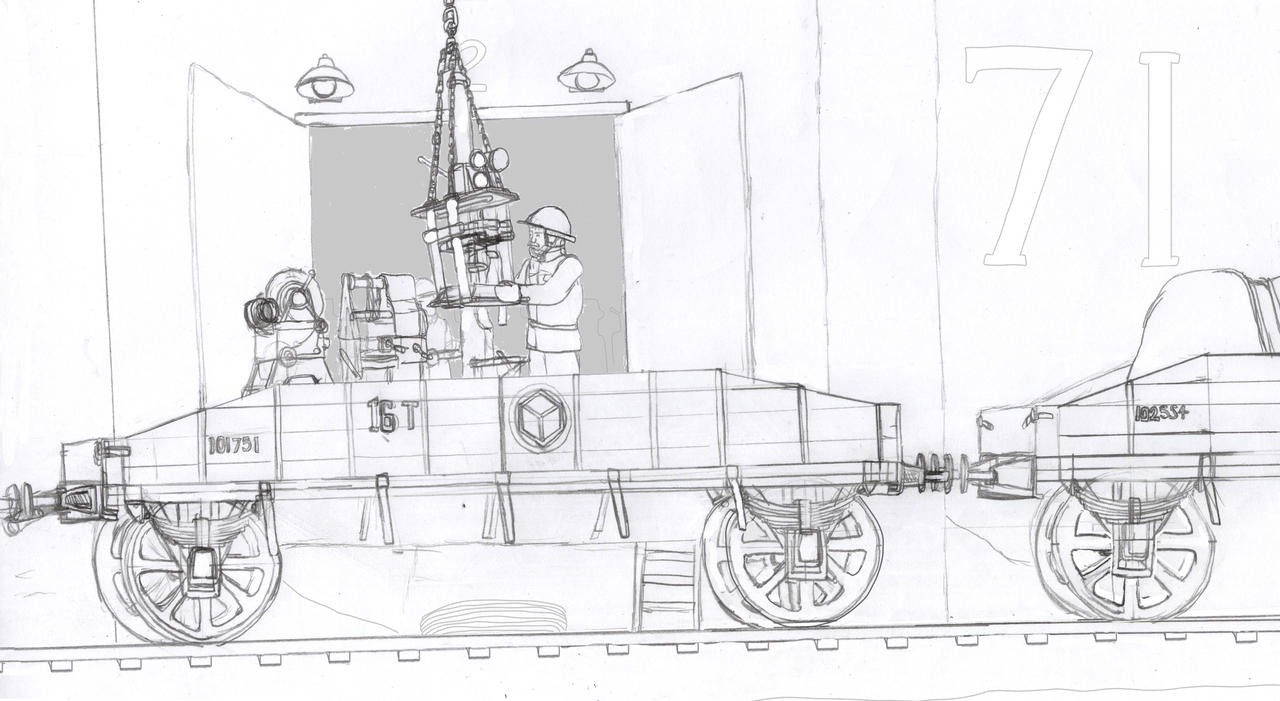 (Tabula Rasa probationary settlement, Infrastructure, Late Winter, 45 IA)
(Tabula Rasa probationary settlement, Infrastructure, Late Winter, 45 IA)
On the other side of a window snow fell in large wet clumps, making it hard to see across the street. Talsi ti'Xolcas took this in for a couple of seconds before her gaze went to a pot of game stew simmering away on the iron range. A pleasant aroma wafted from it, soothing her woes. As always, she had a lot to do. But at least she could do most of it in the warm.
She let out a sigh and surveyed her domain, taking in the familiar 30 square meter room, the dining area with it's tabled and kitchen sectioned off by a counter-top, currently empty save for herself. There were still a few dishes from breakfast to wash, but the counter and tables were clean. A pan full of Pirozhki sat ready for the oven and a flattened out section of dough by it. In about ten minutes a clockwork timer would chime and she'd take out a set of fresh baked batch of the stuffed buns to cool on a display stand, put the uncooked batch in start working on the next after that. The dishes were not pressing, but this was as good a time as any to sort them out.
As she scrubbed, she heard a chime and a brief drop in temperature. An hour ahead of the noon Lunch Rush someone had come out of the cold on a day like this, that limited the possibilities considerably. A quick glance confirmed her suspicions.
"Good morning Virath." She said calmly. "Cold enough for you?"
"It's not the Cold Talsi." He said as he hung up his jacket and slipped out of his boots. "It's only about negative five or so. It's the snow and wind." The light prod put him into a receptive frame of mind.
"The regular?"
"Please."
Talsi filled a bowl with borscht and added a dollop of sour cream to it. The Coldland Soup had become surprisingly popular with Drow POWs, beets where cheap and kept well and she could make it better than most. "So, how are the pipes treating you?"
"Nothing unusual, hooked up another toilet today at no 3 Pine." Virath took a seat, setting down his tool box. "Still have one to go, thankfully it's the ground floor." Flush toilets had begun to show up earlier this year, with each building being issued two by the Ministry of Construction. It was a much needed improvement, even if installation had taken some time. Virath had been taken on as a plumber's apprentice in the camps, completed his training not long after and he'd been making good money installing and fixing pipes and fixtures. "Also found out that Xelyian's pregnant."
That perked her ears. "Really? How far along is it?"
"If I had to guess, about three or four months. But I could be off."
"Well, she'd better take it it easy at the Infusery." Most of the residents of Tabula Rasa did some work there at least some of the time, feeding mana into raw potions and stone slabs for rune-craft. A straightforward source of income based on piece work and less physically demanding than the sawmill, but not something everyone could could keep up full-time especially when pregnant. The last thing you wanted was to drain yourself dry day after day and out and have your baby born Unkindled*. "But that's the third pregnancy i've head about this month alone. Guess little Jihrei opened the sluices." She set the soup and a couple slices of dark brown bread for Virath.
The idea of having a Drow child in Infrastructure had been absurd back in the camps. What sort of life would they have living in a barracks toiling away under the thumb of lesser beings, hated and reviled by their kin for being the get of disgraced cowards and betrayers of the divine destiny of their race? Things began to change when people got onto probation. People began to talk about it more, typically to run through the reasons against it or as a jest of some sort. But that the idea was being articulated more openly in of itself was in retrospect a sign of the change. Gradually people warmed to the idea in spite of all the arguments against it, especially once their apartments were finished. When Naxthet zi'Mourkel announced her pregnancy it caused a stir, as did the birth of Jihrei seven months ago. But it was a stir that had it's defenders. There were still objections of course around town, even so she was convinced that many people simply did not want to be the first.
"She's a decent hand with leather and can take care of herself. But have you considered having a little one scampering about?"
She gave it a brief thought "Maybe some day, but there's no rush and I'm already swamped."
"Fair enough." Virath grabbed the counter and leaned to the side. "But if you're feeling lonely in your room on these cold evenings I can help you with that in a more mature fashion."
Talsi smirked as she poured his tea. "I'd give that one a seven out of ten, and I might be open for it on Wednesday. But right now I'm just too damn busy."
"You considered hiring a helper down here?"
"Of course, it's just that's it would be a big expense."
"But you'd get more done without wearing yourself out."
"Yeah. If things go well I'll probably do it this year. I'd just want some more savings in reserve in case things go pear shaped." She was proud of her little Restaurant, she'd started work on renovating the storefront as soon as she got her share of
her building. She spent months getting it presentable, from laying tiles to setting up a fresh sink. It took months and a lot of sweat to get set up, let alone the effort to keep it working. Despite that it her cafe was popular. She regularly had dozens of patrons and over the last year usually got thirty to forty credits a day, though there were expenses, most notably ingredients even at bulk-rates. Cut off from her former life, she'd found purpose and fulfillment in Tabula-Rasa. Similarly, she'd seen several other ventures falter, fail or never catch flight. This made her wary of expenses and prone to save as much as she could in case something happened. That said, new arrivals came into town fairly regularly, which meant more customers and more customers meant both more work and more folk in need of a job.
"Fair enough." He replied as he took his first spoonful of soup. "Lovely as always."
*
Unable to generate magic internally. For Elves this is considered crippling, especially since it cuts the lifespan down to at most two centuries.
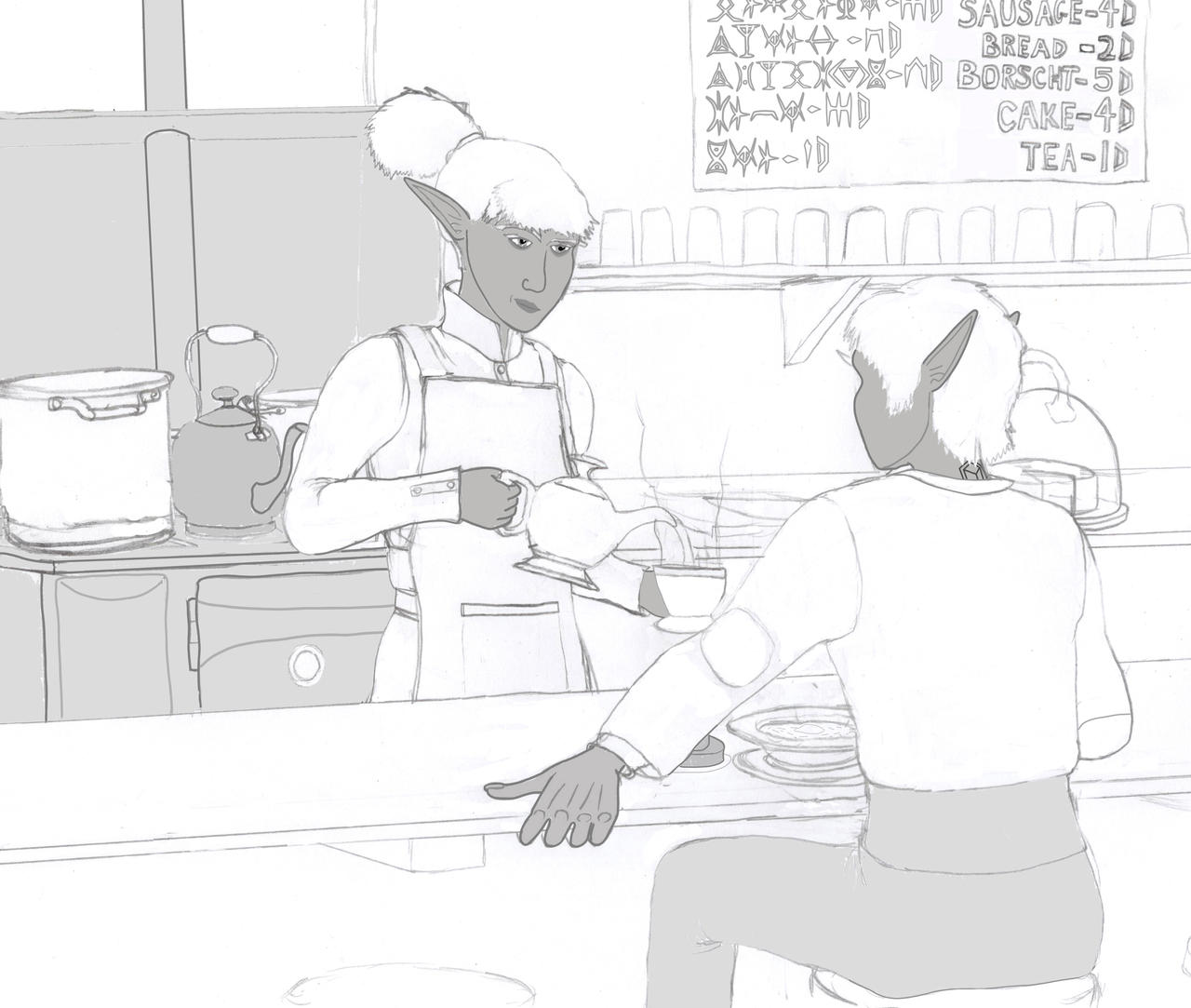 (Infrastructural Railways, Spring 45 IA)
(Infrastructural Railways, Spring 45 IA)
"All Aboard! All Aboard!" The familiar cry and the ringing of a bell echoed through the passenger car. A few seconds latter, the doors opened and new passengers began to file in. Many of them had been returning passengers who'd stepped out on the small station for a stretch on it's hour-long stop, but there were some new faces who'd just begun their journey. Ghrody Tsimil was in the latter category as he clumped his way in. He let the conductor punch his ticket and following the examples of other passengers stowed his bag in the odd cabinet before taking a seat on the bench as he tried to make himself comfortable.
He was sharing a seat with another passenger, a well dressed woman with glasses about his age reading a small book. She seemed pretty into it and it seemed rude to pry, so he simply sat back. He considered finding another seat, but the car was packed. A short while latter the locomotive's whistle blared, it's bell rang, it's pistons chugged and the train began to rattle forward. Soon it cleared and he took in the landscape as it rolled by his window. Fields were being tilled and seeded, herds of cattle and sheep grazed and trees moved by. It was hard to keep track of any one thing for long, but regardless he was fixed on it.
"Quite a view." The woman seated next to him said.
"Oh yes." Ghrody replied. "I've see these sights all my life, but never like this."
"I was like that on my first trip. Still impressive, even if you eventually get used to it."
"How often have you travelled by train?"
"Thirteen times, not including this trip."
"So where did you go?"
"First to Dalatyr for school, then back to Fyodirm for solstice for the last three years."
"You've lived in Dalatry?" Ghordy was impressed, he'd heard stories of the city. "What's it like?"
She rolled her eyes "Full of riches and mechanical wonders, lively, busy, cramped and dirty. Some parts are better than others. I was as a clerk at
Dalatyr Writing Machinery, which was fine if a bit dull at times."
"So you don't work there anymore?"
"Not anymore. There was a new posting that offered 16 credits a day. It's for a construction project called UL-144."
"Really." Ghrody replied. "I was hired to work on UL-144, along with a bunch of guys from my Co-op. That's how I got my ticket."
"Not surprising. There's a bunch of guys in this car alone who are heading to UL-144, including yours' truly."
Ghrody was a little surprised with this. "So how much Clerk-Work would a construction project need?"
"Plenty. Handling payroll, progress reports, requisitioning supplies, making memos. So many memos. The bigger the operation the more paper you need to keep it moving."
"Well well. My name's Ghrody by the way. Ghrody Tsimil."
"Lavra. Lavra Lymirelko. Pleased to make your acquaintance."
"The same to you. Just out of curiosity, what were you reading."
"Tatanya Tikorov and the Azure Rose. It's about a Detective who has to catch a thief who leaves a blue flower after each robbery." For some reason, Lavra seemed enthused about the story. "It's part of a series and it's pretty good."
And so the conversation continued. While there would be some breaks, the dialogue would fill a significant chunk of the next four hours. In general both of them found the experience pleasant and by the end they'd counted each other as friends. In total there were 64 passengers in their car and 367 on the train in total, most of whom did not have as pleasant an experience as Grody or Lavra did, but all of them arrived safe and sound early in the evening near the Urblaast/Loriv Canal. Tomorrow another fully loaded passenger train would empty there, and two on the day after that. More arrived by Paddlesteamers and barges, which also brought in supplies and provisions. The Central Committee's latest project required an army of workers which were recruited, mustered and deployed with frightening efficiency.
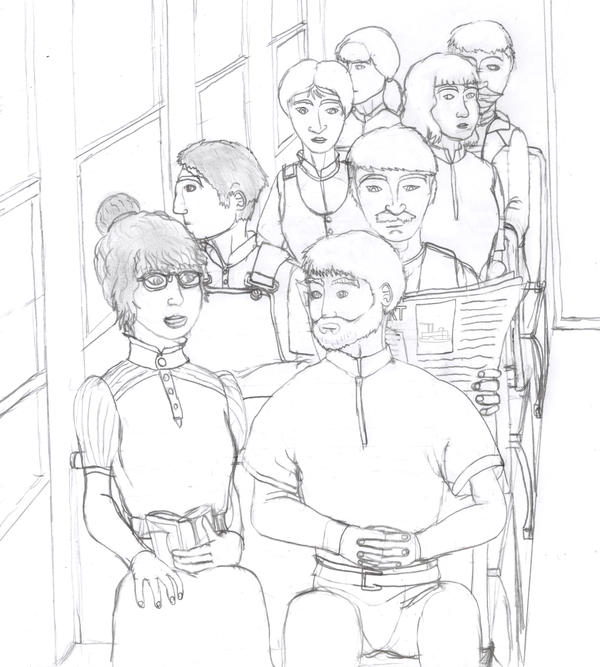
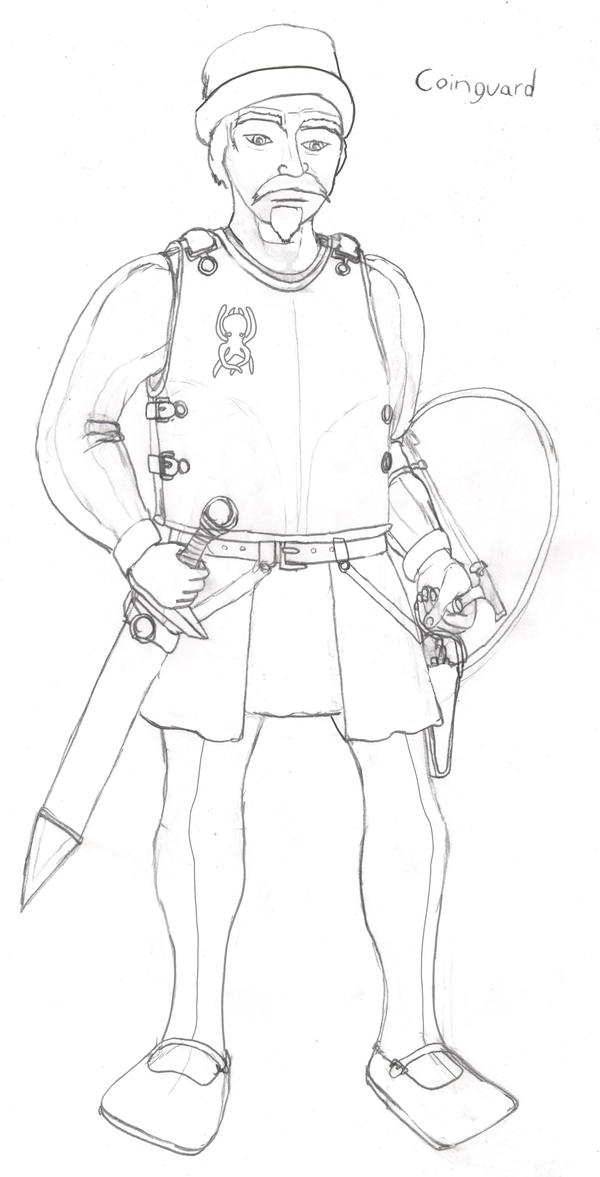





















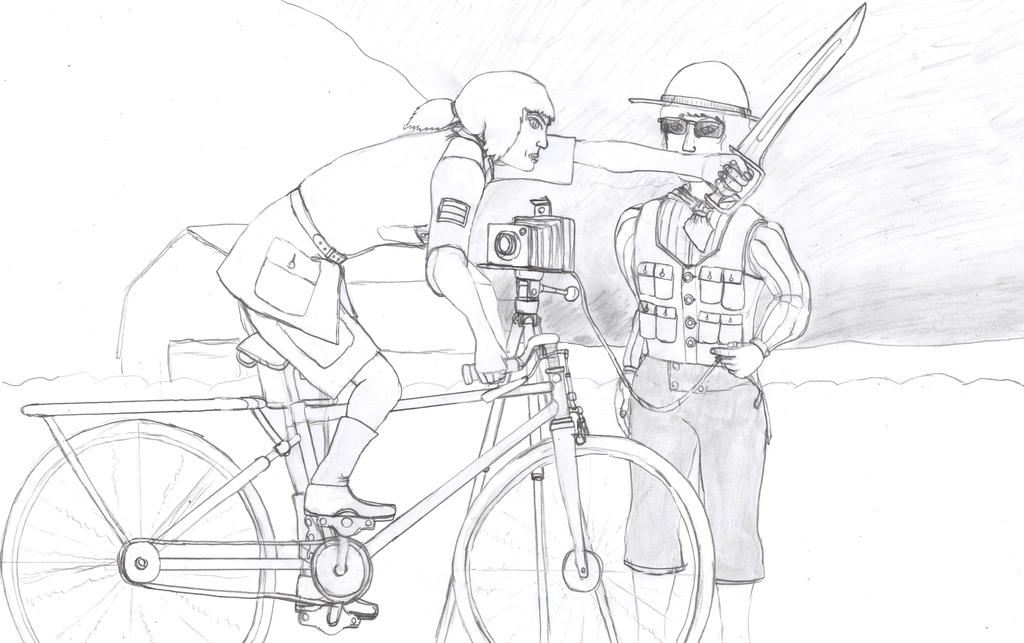

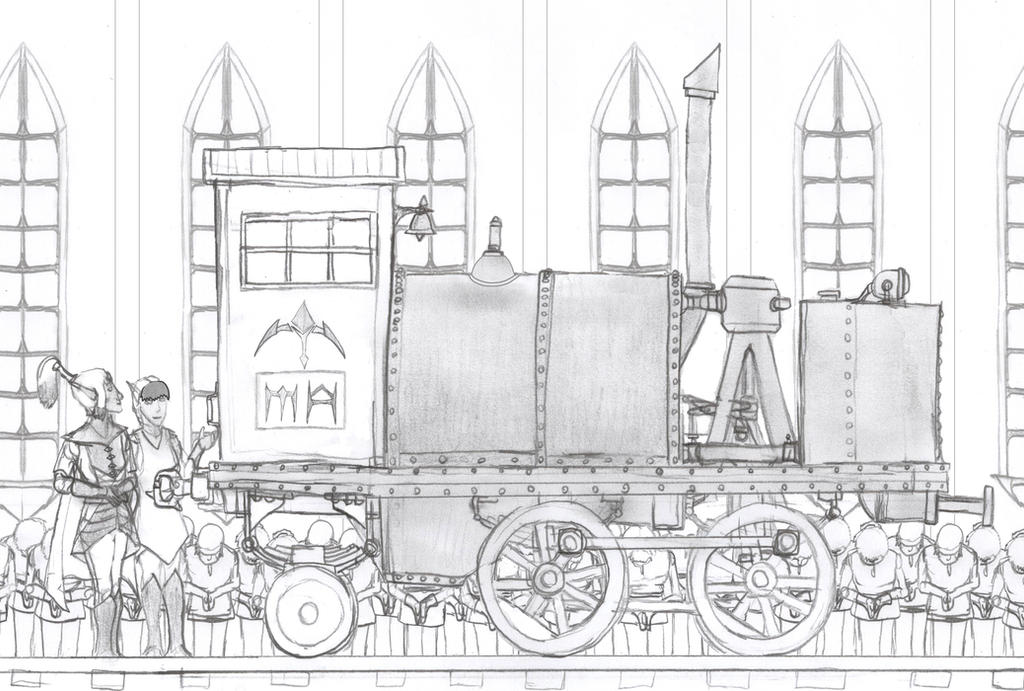

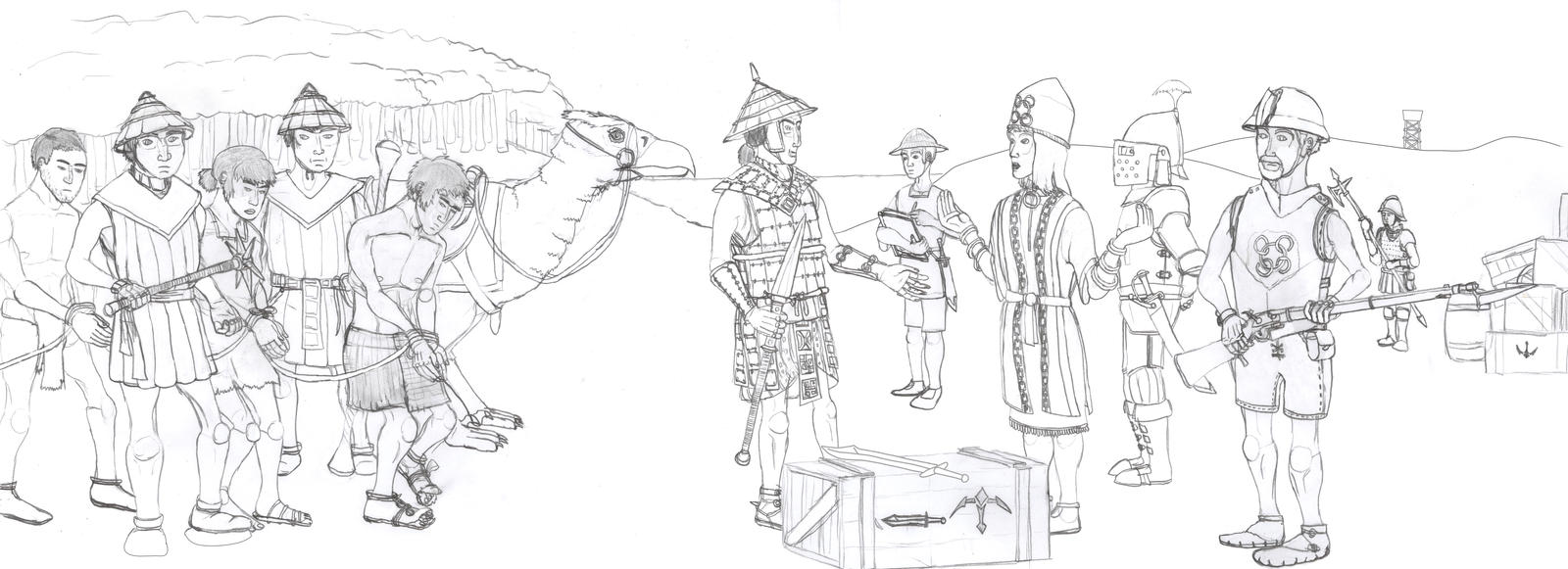
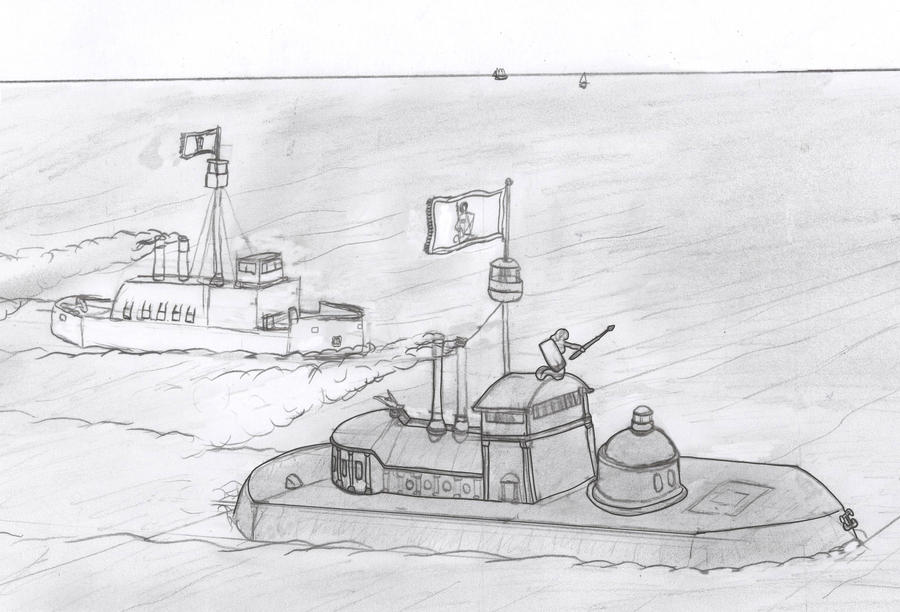
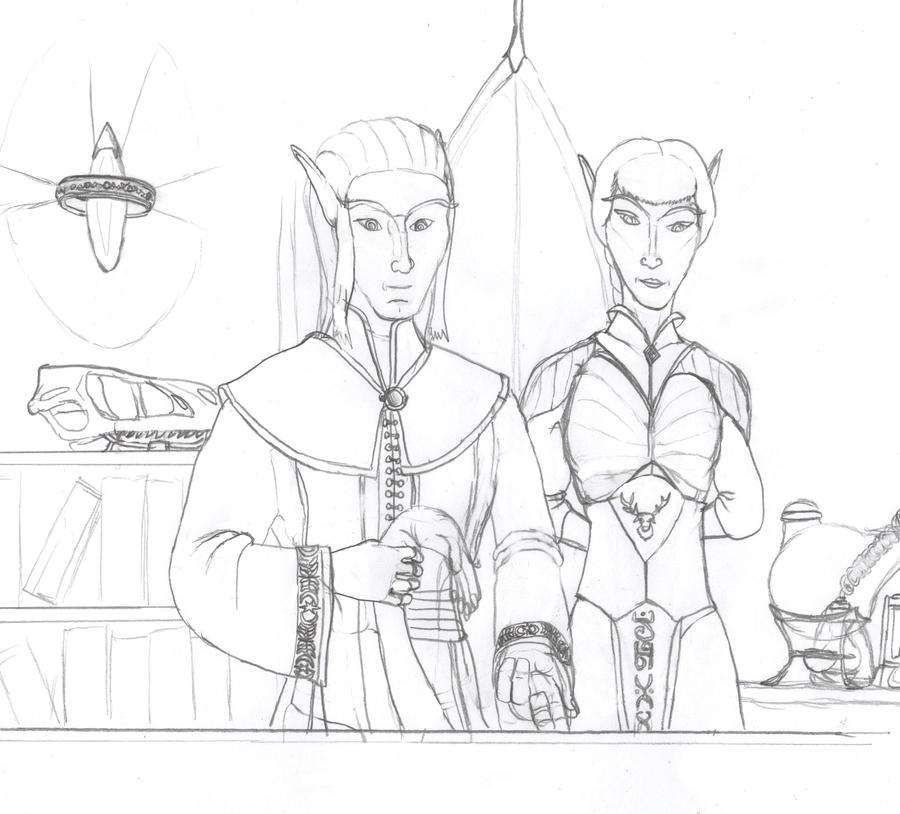
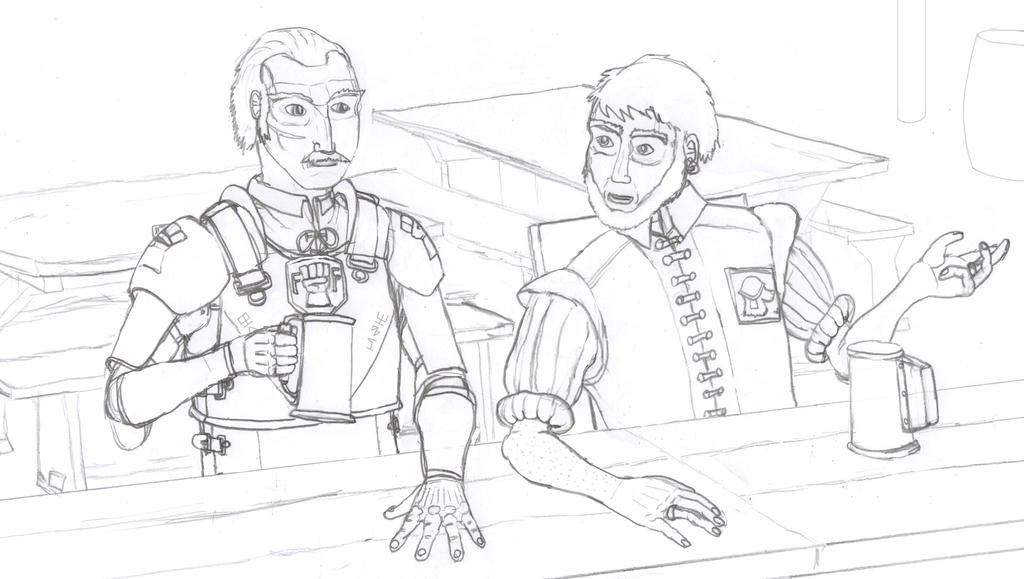
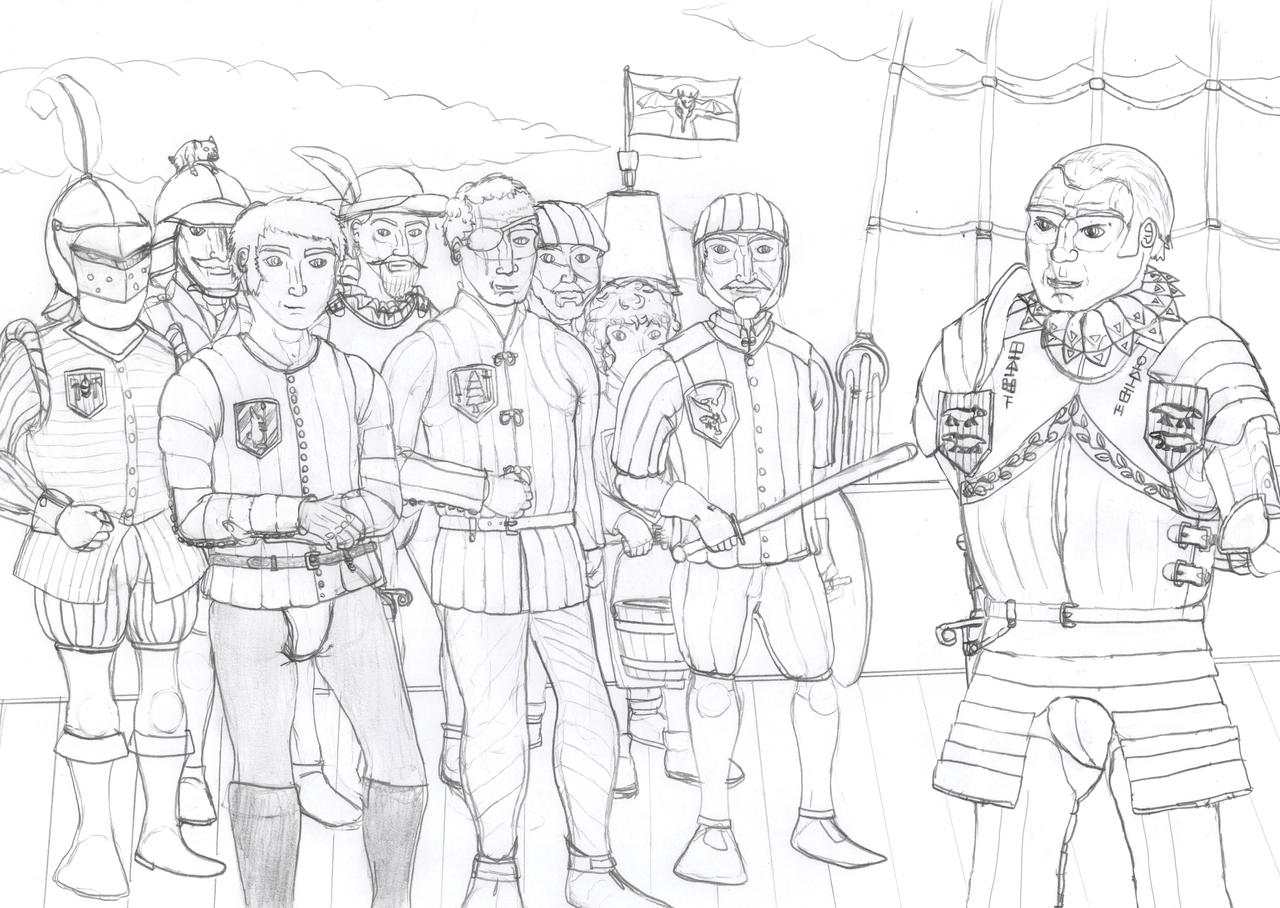
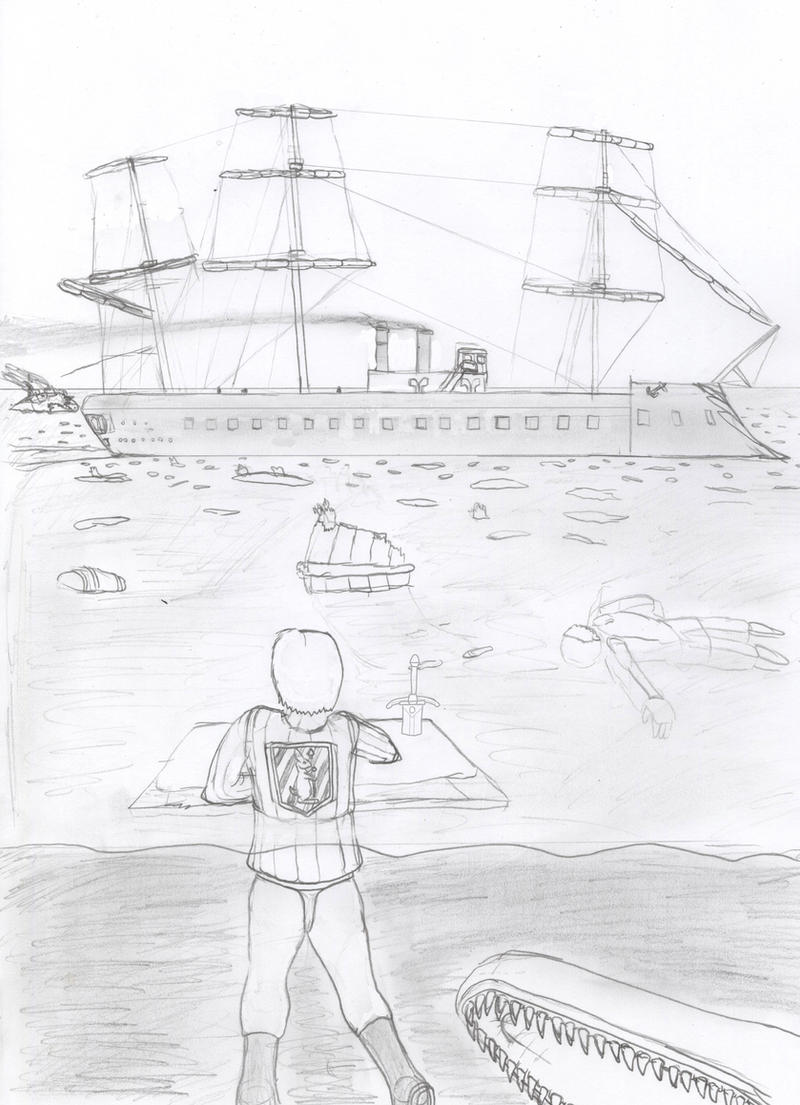
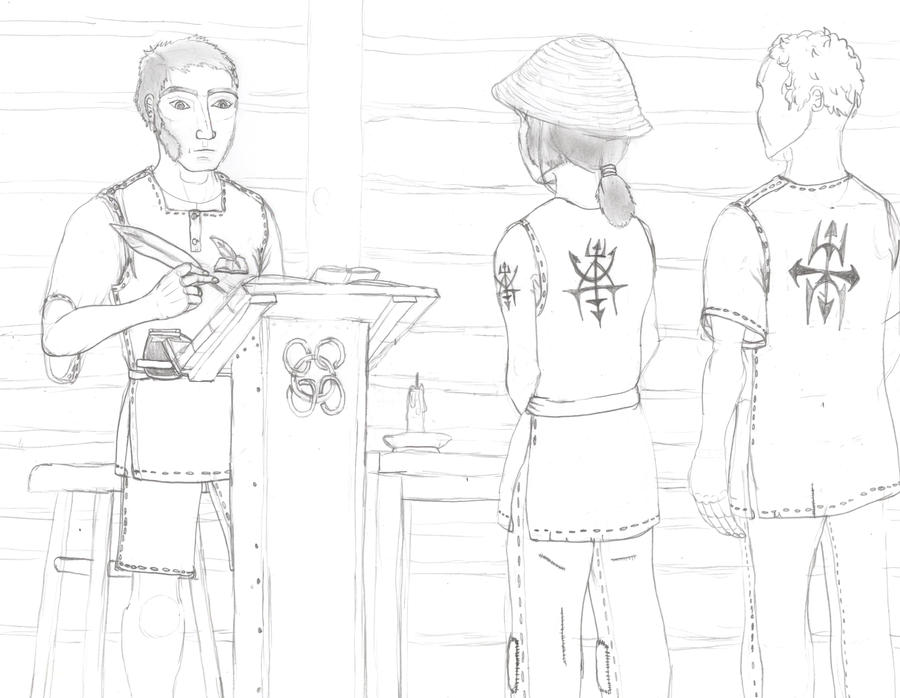
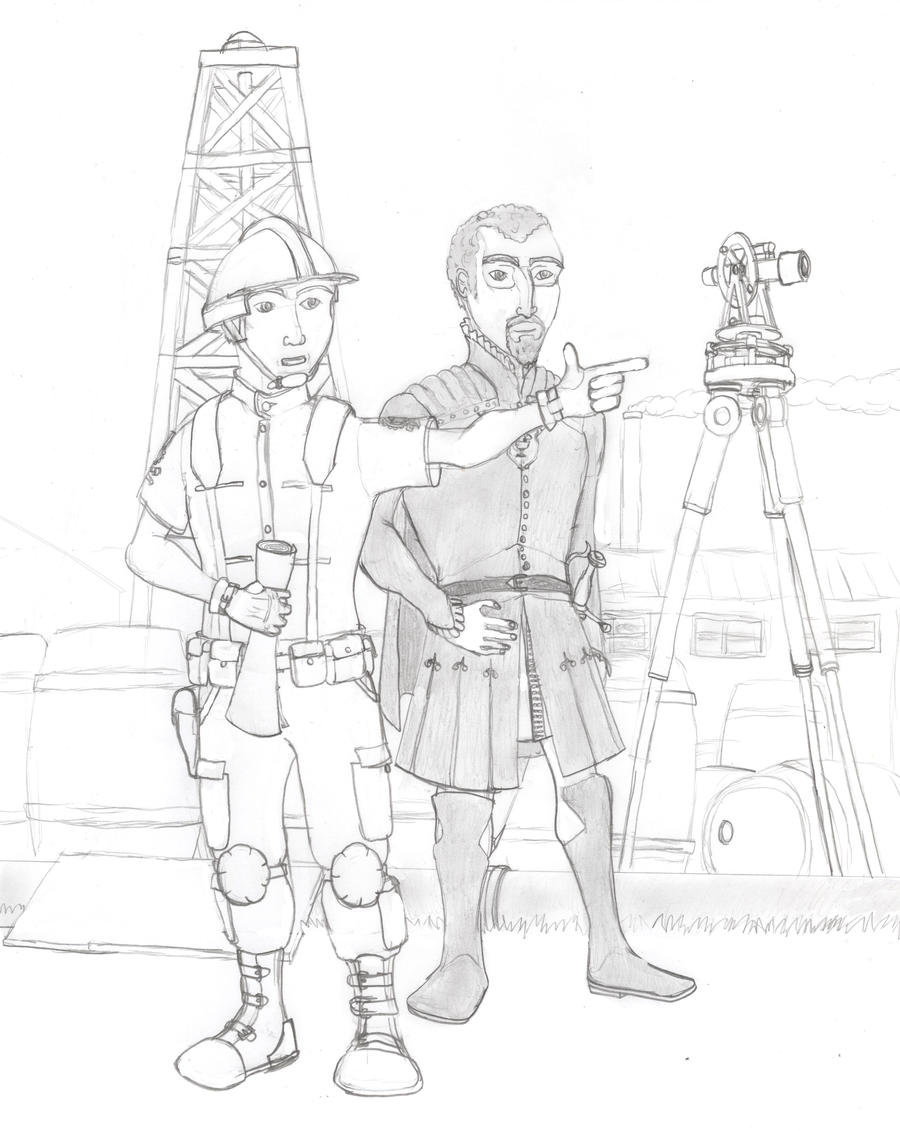
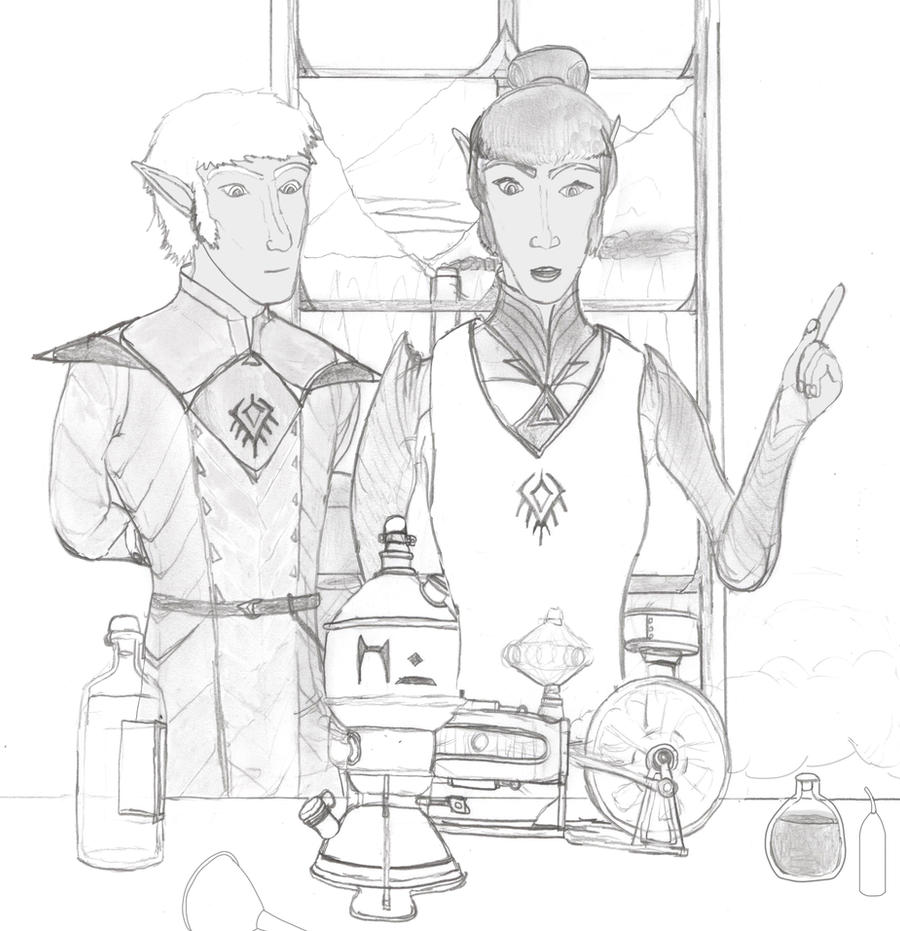
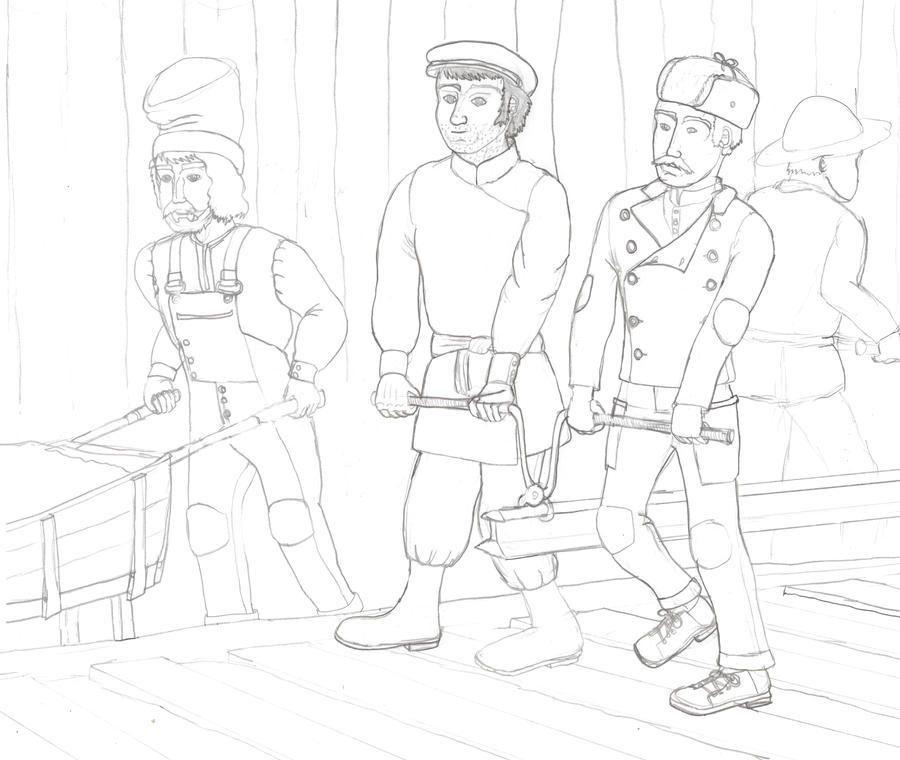
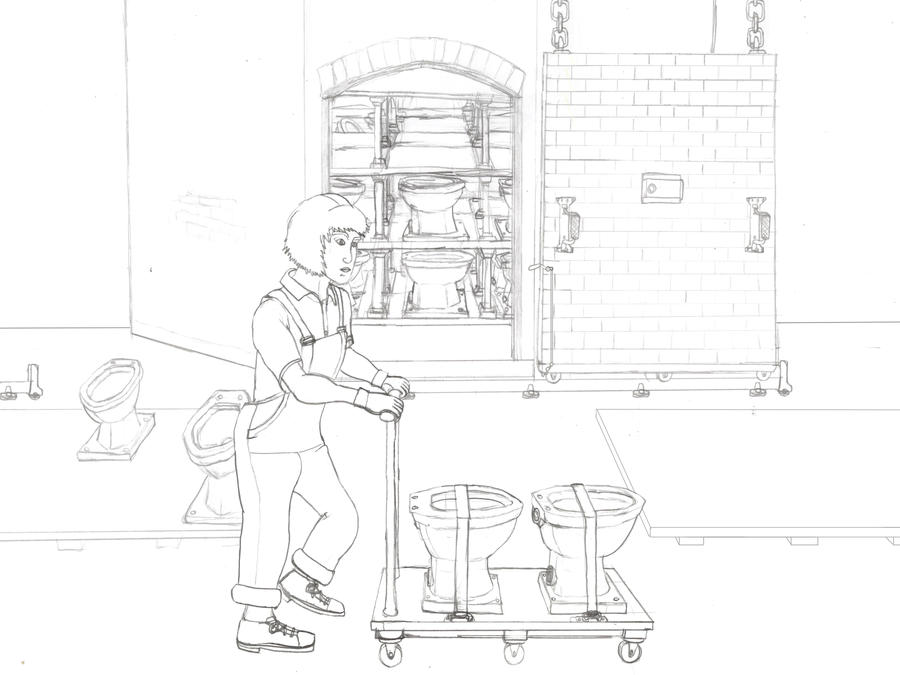
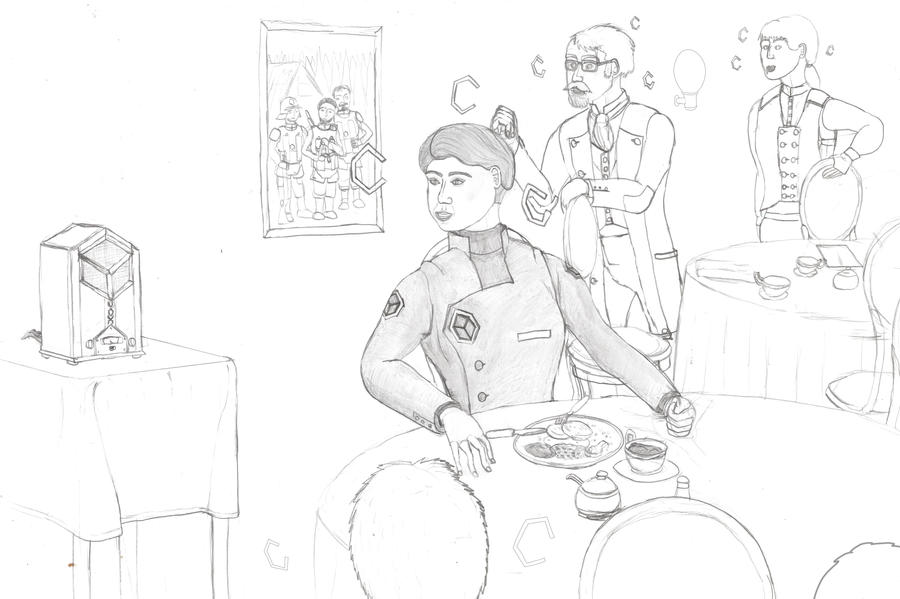
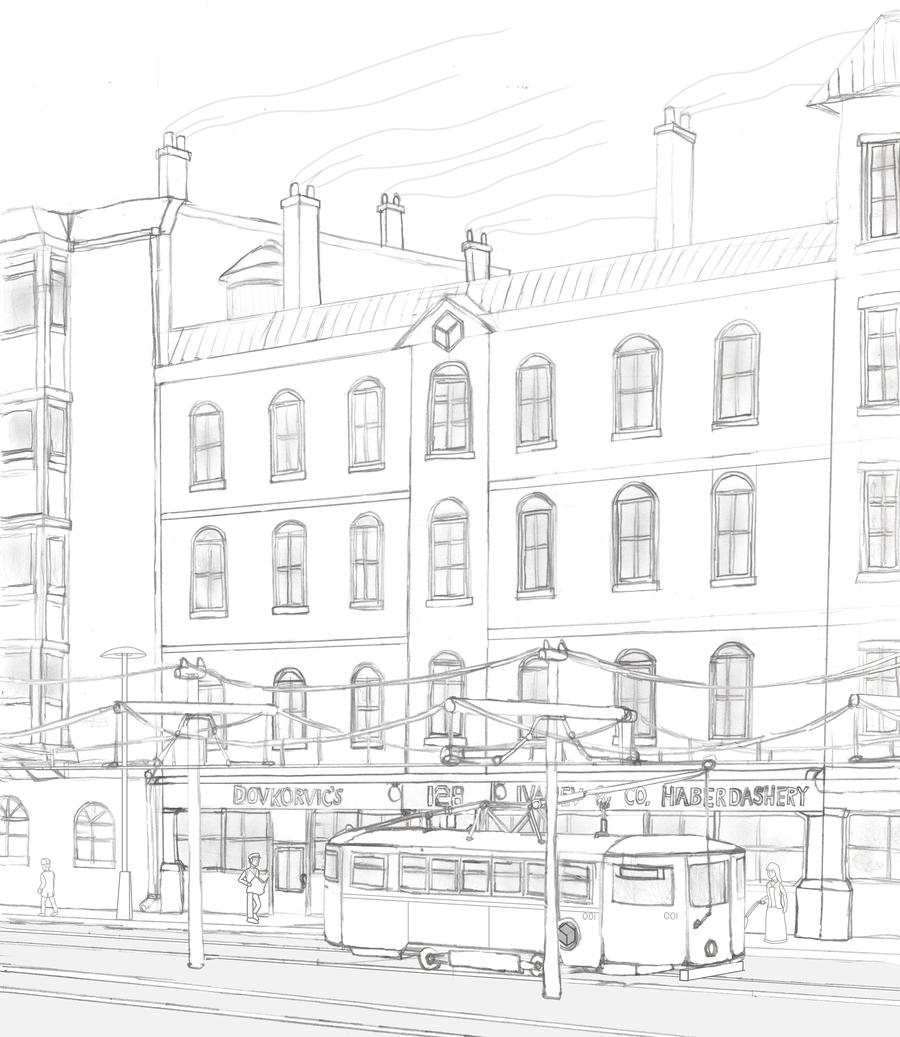
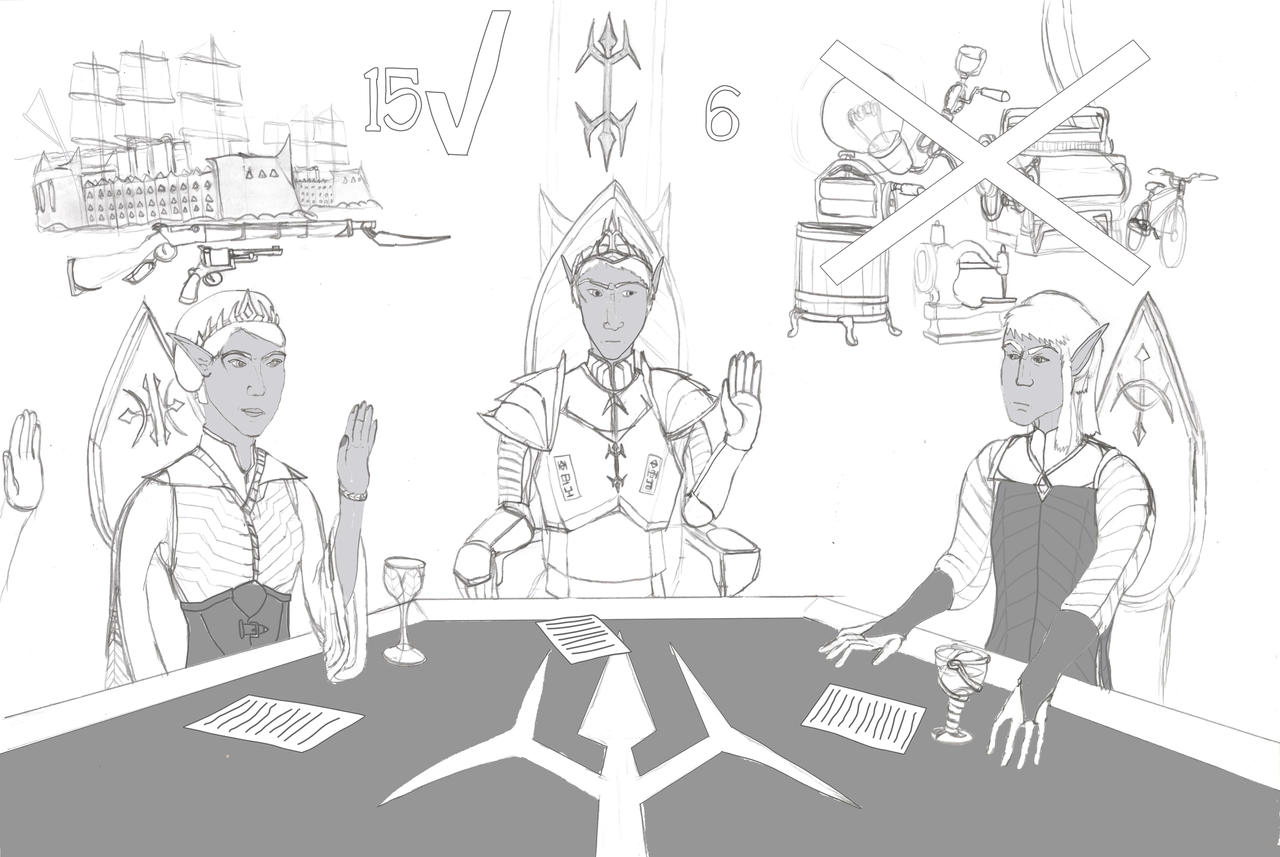
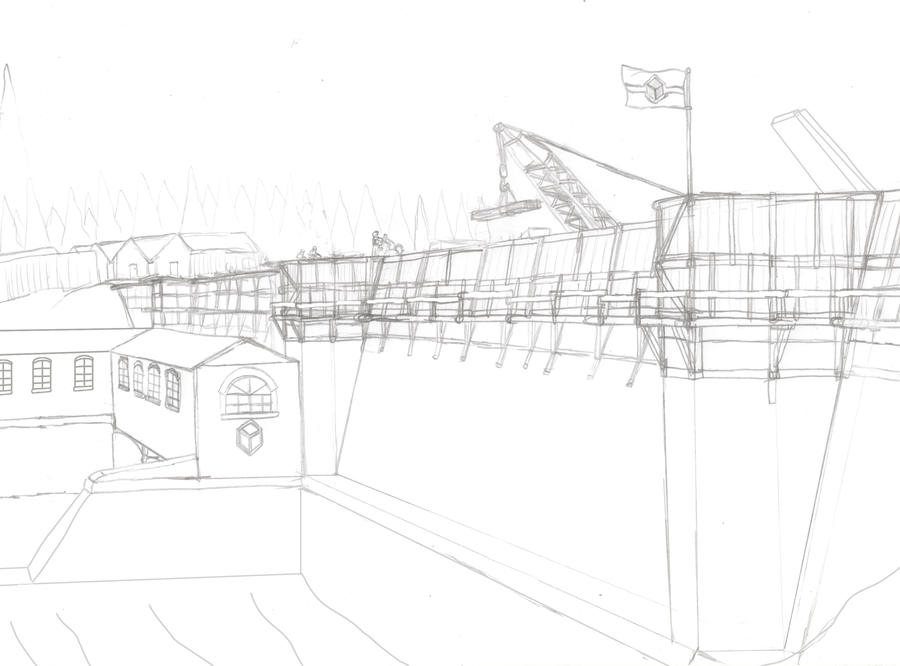
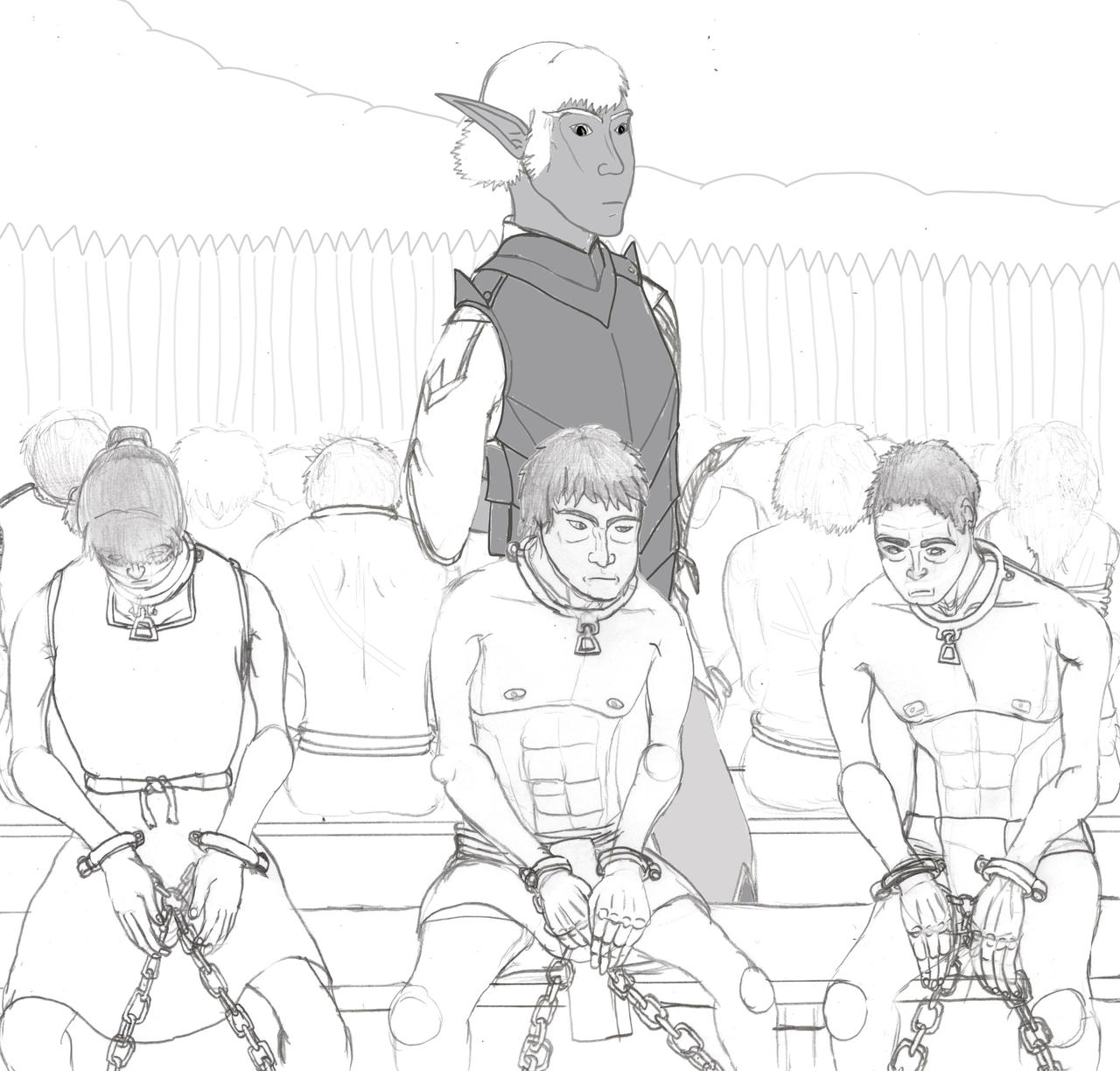



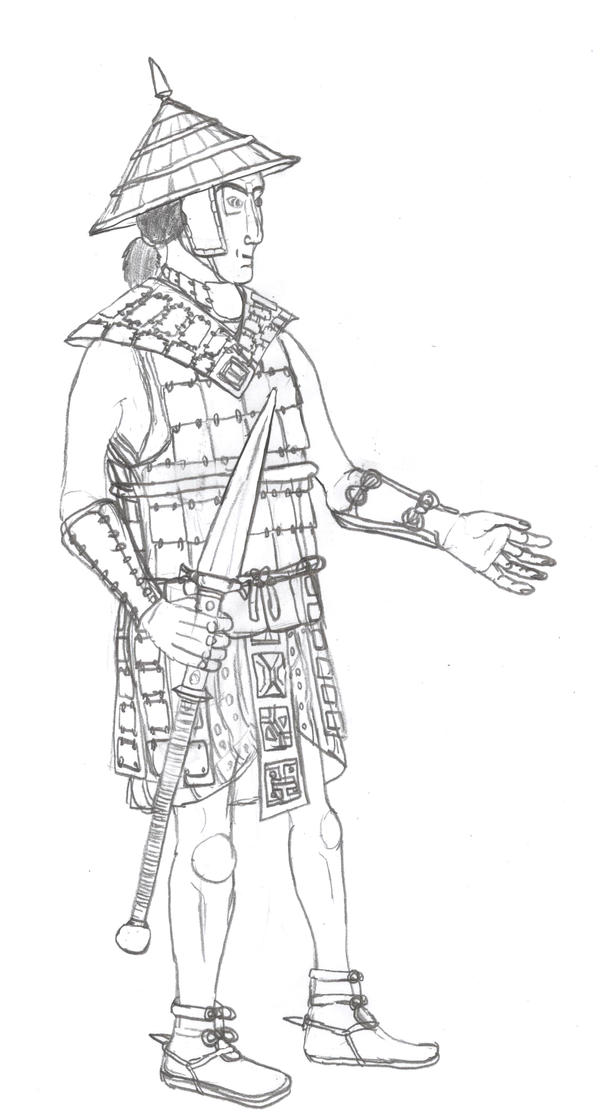

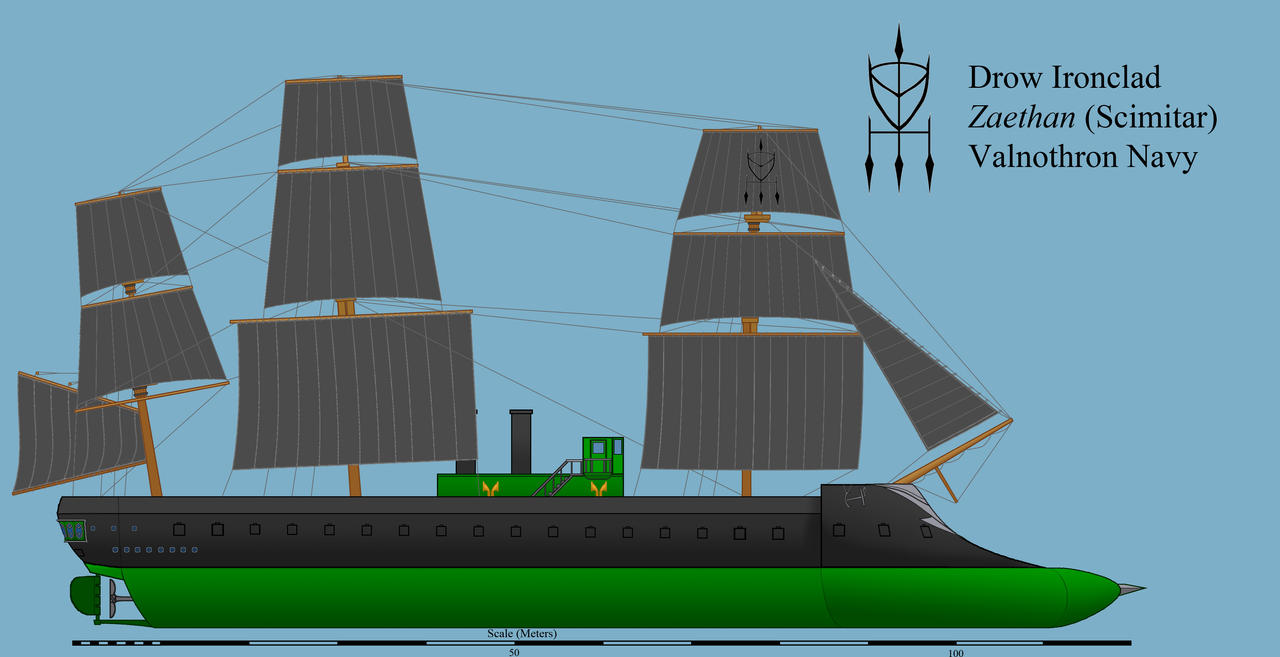
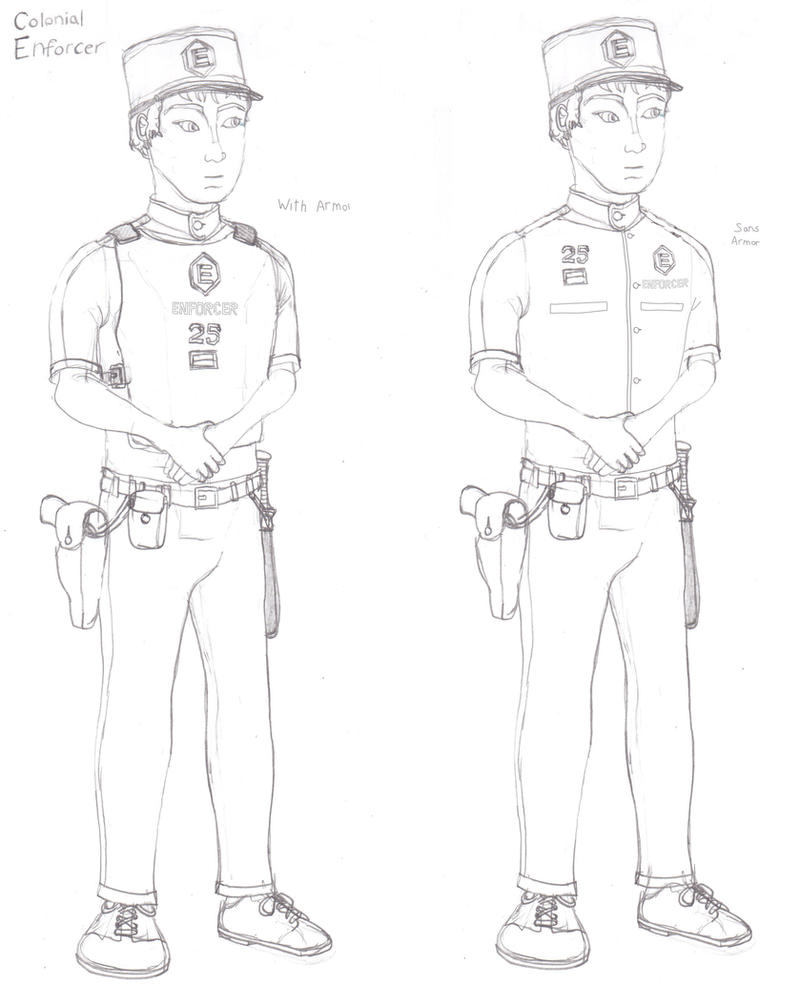
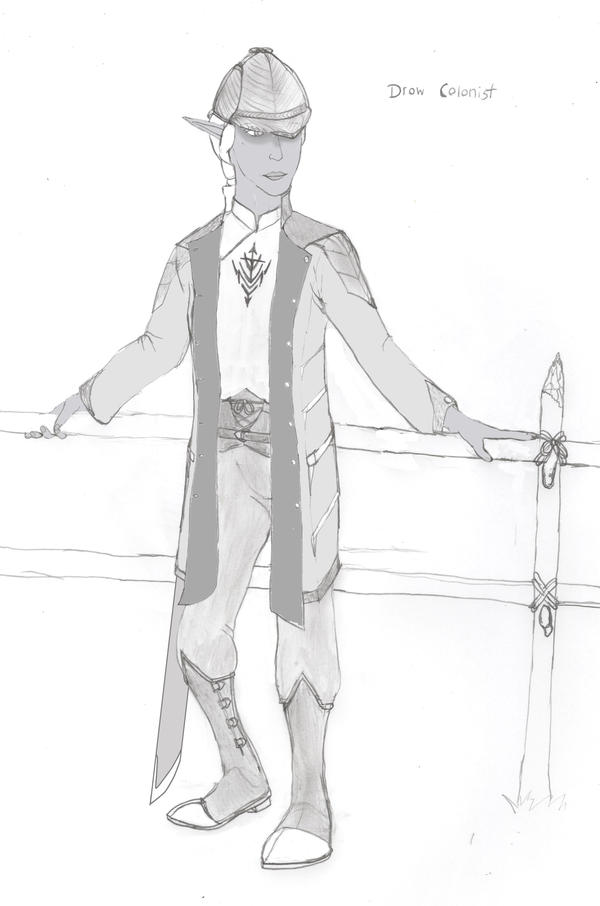
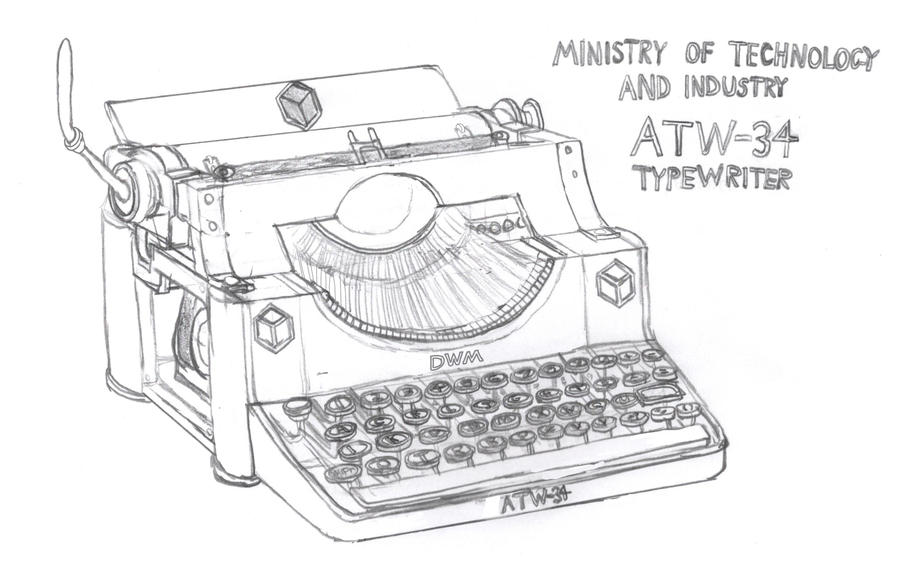

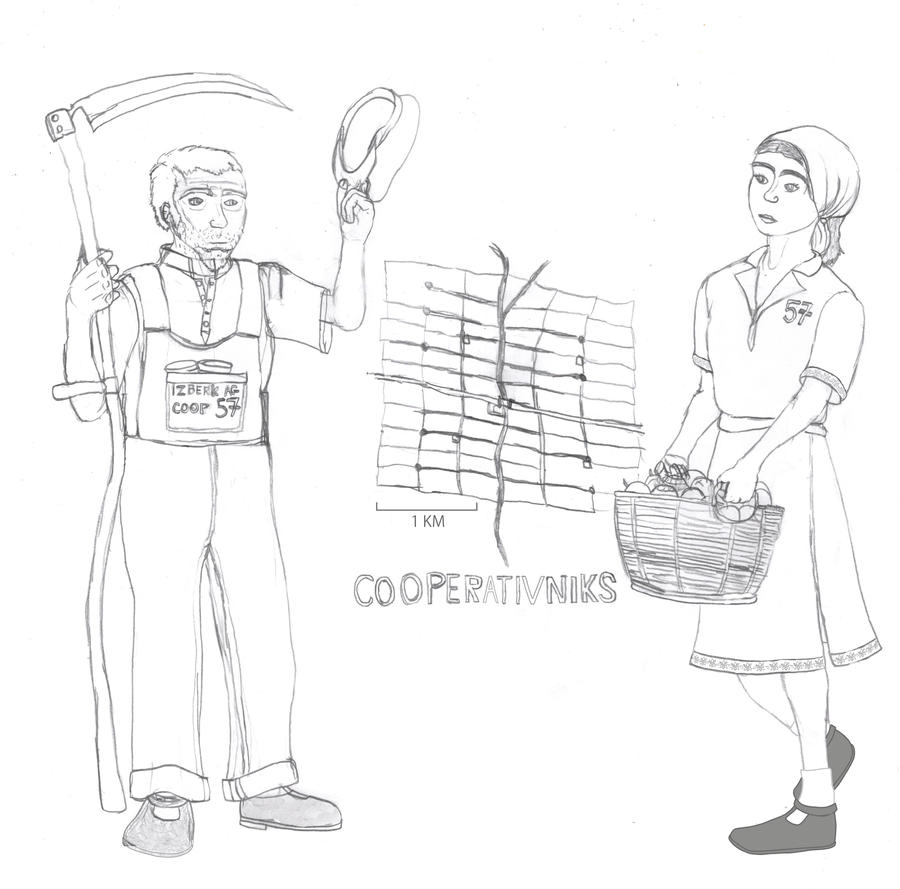
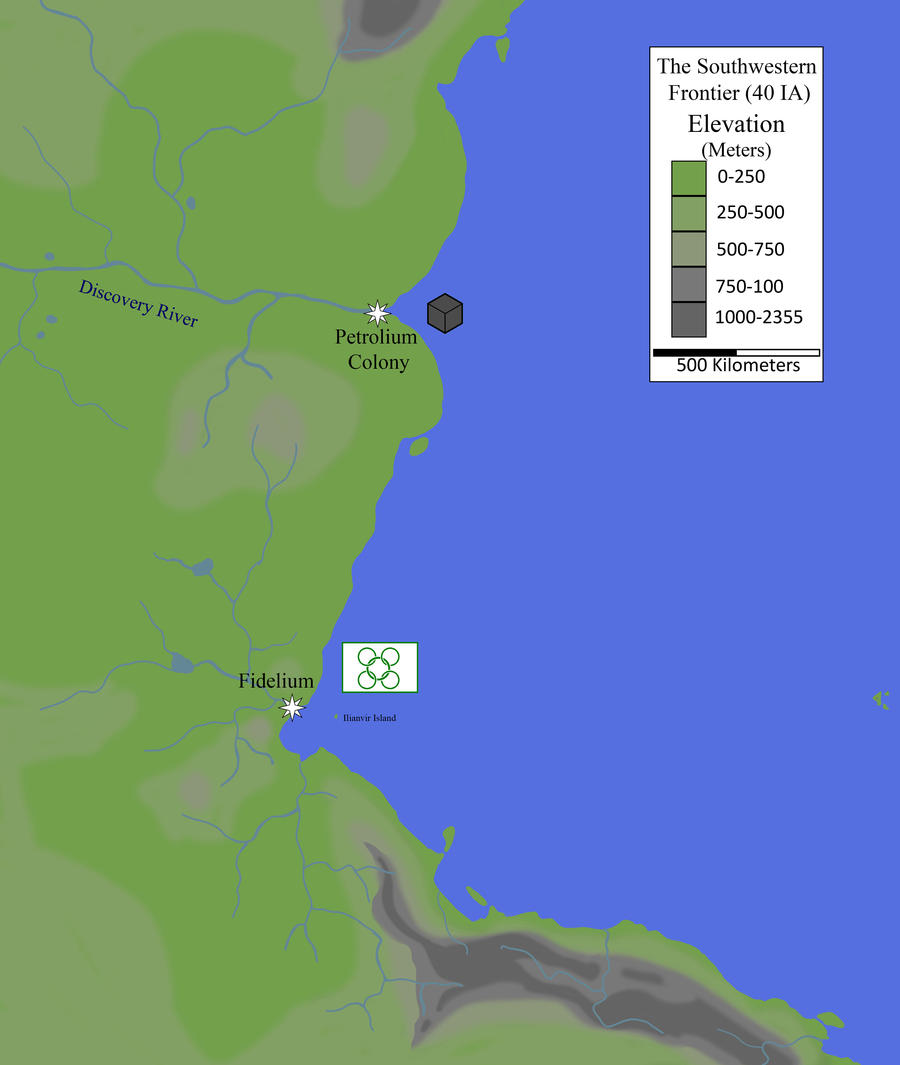
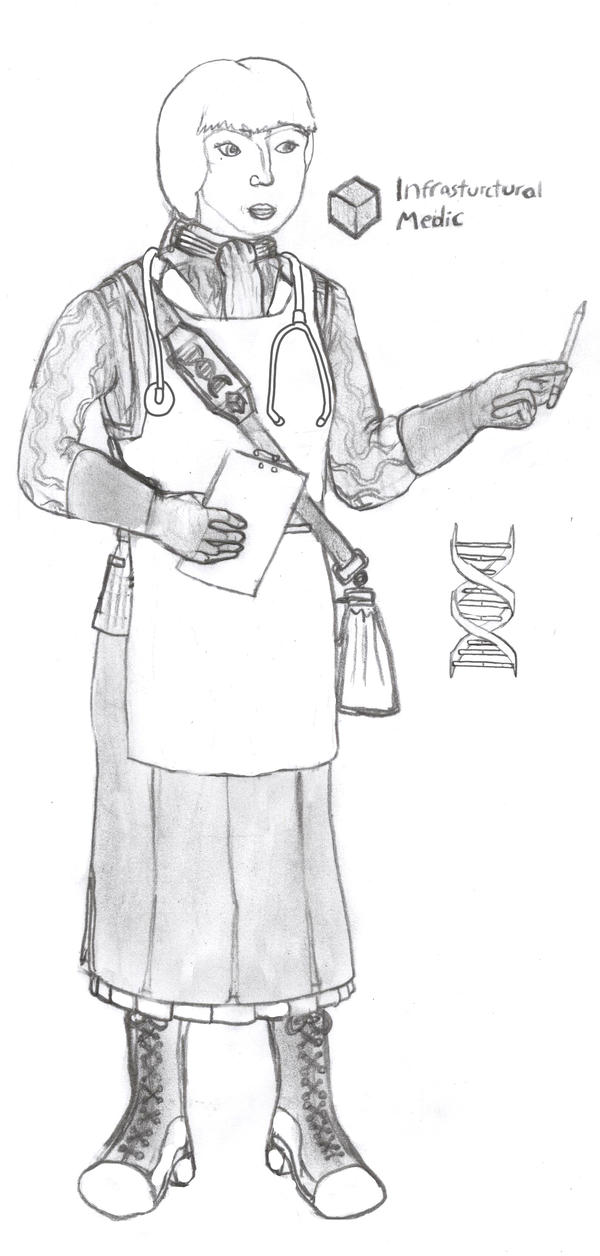

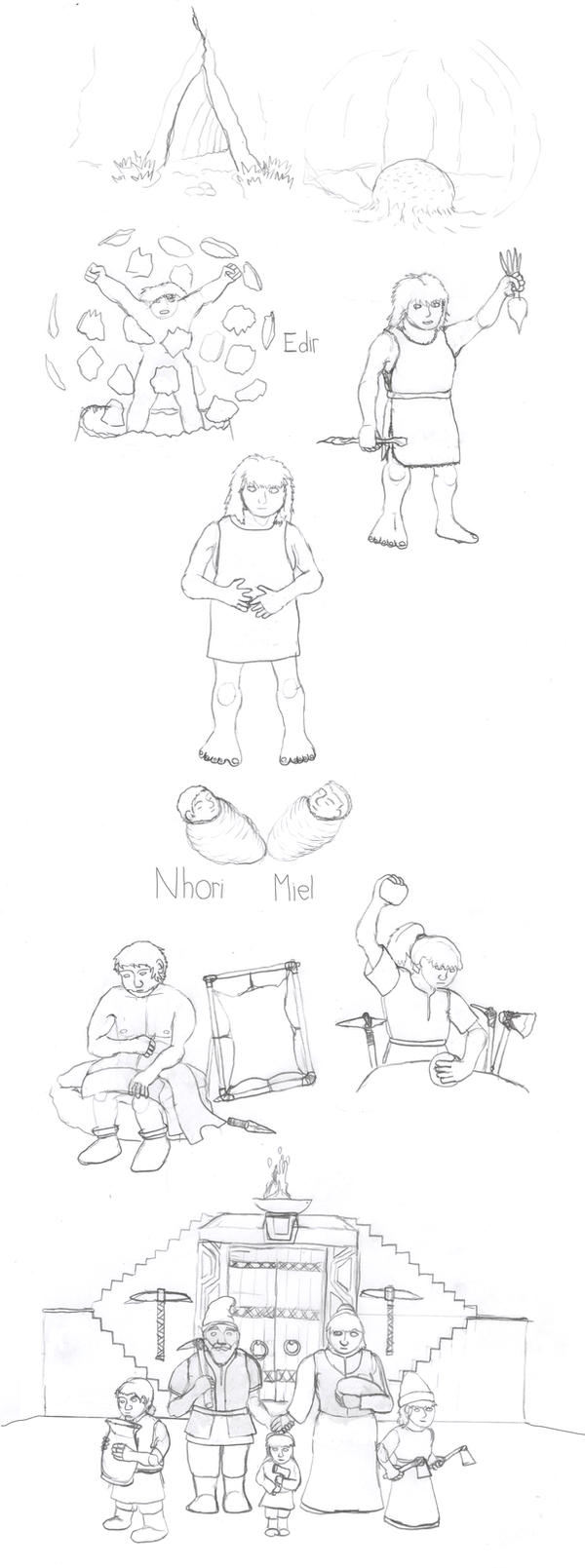
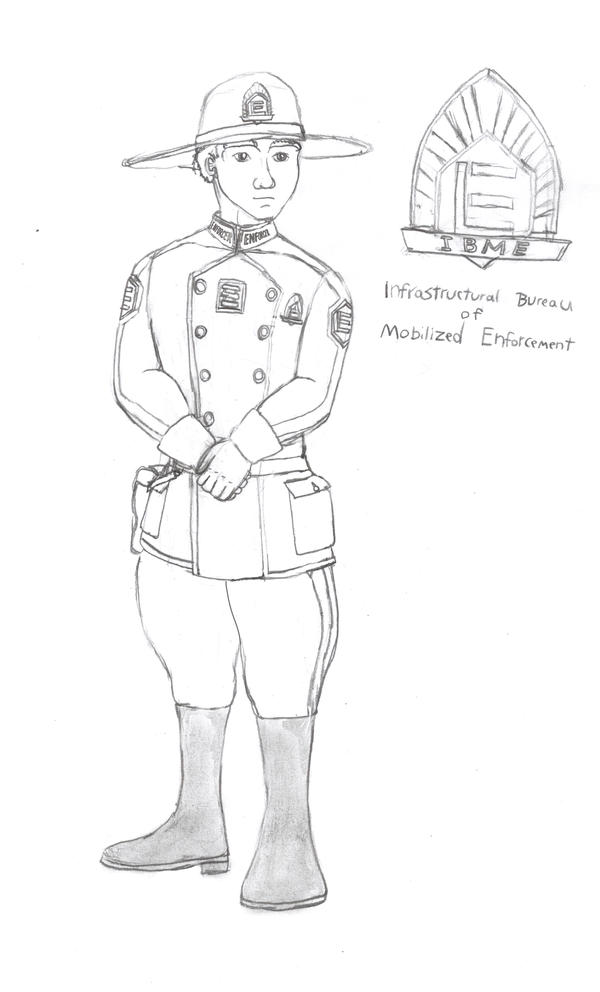 a
a